#on her & how she works at any point. shes a complicated character.
Explore tagged Tumblr posts
Text
on today's episode of 'acaica's background thoughts for the dess raises kris au': okay but lets be serious do dess and chara actually stay together in the end--
#drkau#chatter#i debate over this point SO OFTEN LOL#they are BACKGROUND characters. like medium at best.#dess (or asriel or both you can argue any way) is the catalyst for everything but at the end of the day this is a kids story#and noelle IS still going to be the main character#but. man. does desschara work it out#their dynamic will be by far one of the hardest ones to write it think#it is very messy and very complicated and neither of them make great choices#and ive been writing a test piece of them for a WHILE#which. was good to get a decent nail of their characters as they stand in this au#but introduced SO MUCH MORE MESS. bc chara is aroace and 100% has some trauma and fucked-up feelings around sex#but xe DOES have sex with dess. and its like. does xe fully consent to it? yes!#does dess check in to be sure hey you're down bc she knows chara is ace while she isnt? also yes!!!#by the books they do everything right its just. chara is very very very good at rationalizing things.#and xe is. not actually as okay with this as xe is trying to be. and in fact this is very unhealthy for xir#(and then theres this whole OTHER layer of dark worlds and prophecies and everything that leads to frisk being born)#and its like. man. Man. this is so much to juggle#just everything between desschara is jngdfg they are trying their bests but it really is not going that well#bc they meet at like. 19-20 i think and chara's had nobody at all and sorta keeps chasing being someone's most important person#and dess has never had someone who has understood her on a level like chara#who really truly gets what shes about as a person and how she operates in the world#and its just a perfect storm really. and they both have kids and dess did technically kidnap hers just a little bit#and she never tells that to chara. and she tries but she cannot stay in place with xir#and chara couldnt hate her bc. again. has never experienced unconditional love#or love at all really </3 so instead of ever having hard conversations xe will brush it all under the rug#and sorta just enable dess's worse impulses. even sometimes at the expense of their literal children#ITS MESSY YALL. AND LIKE.#at the end of the day we'll see lol maybe they work it out maybe they dont. i have no idea. ive gotta write the thing#and if dr chapters 3&4 come out that could complicate things even FURTHER--
5 notes
·
View notes
Text
if your read on the weapon is that she’s the chief’s new girlfriend then im taking you back to high school level english class so you can revisit your critical thinking skills
#txt#this isn’t exclusive to fans but also like. @343i.#1) people only say that bc shes a copy of cortana not bc theres any chemistry literally at all#2) look at the ‘cortana is replaced w a non mentally ill and younger/naive version of herself’ and tell me thats not gross#3) pairing said young naive copy with her predecessor’s forty whatever year old former best friend…?????#literally how does any of it make sense to people. its not even funny as a joke…#every day i hope this is not the direction 343i is going in for the weapon and every day it seems that that is. actually what theyll do#it just feels so gross on so many levels LOL#im just trying to brace for impact at this point#like yeah to bad we completely fucked over this established fan favorite for a moment of shock value. now how do we dredge the emotional#impact of this franchise which is founded in that characters relationship w the protagonist#oh yeah lets copy her and make her younger and less complicated. that’ll work. LMFAO#AUGHGJJFJSMAM
50 notes
·
View notes
Text
𝐍𝐀𝐍𝐂𝐘. / breakdown on her abilities. based heavily on personal interpretation.

content warning for written examples of self injury, p.sychological torture, not being in control of ones own body, of insect references, self-c.annibalism, g.ore & fatal injury. can avoid the bottom section descriptions if too much! they are simply examples. ♡
do refer to THIS POST in terms of interactions with her as she's request-only.

the vast majority of this is highly personally sewn together and integral to how i portray her. anyone i write with is free to reference ANY OF THIS to respond to anything i either send you from my nancy or in threads, plotting, etc! i am leaning into the fact that her canon ability is not normal in the slightest, you can call it a type of witchcraft or pact with a devil of some kind - who truly knows what it is or how she obtained it but herself.
mutuals are free to take any example from here ( or similar ) and run wild with it in responses with my portrayal of her! this is more or less to provide ya'll some context & guide in a sense on how she works with how i write her.
and of course, subject to being continuously updated. :)

𝐓𝐑𝐀𝐂𝐊𝐈𝐍𝐆. nancy's capabilities of tracking are unnatural - she does not often use traditional means in order to follow her targets from the shadows. her tracking ability allows her, for a period of time, to see through the eyes of her victims, visualizing a rough image in her minds' eye of where they are on the vast sawyer property. her hearing in this state is HIGHLY SENSITIVE - she can hear noises from quite a distance away if she's able to concentrate without interruption.
𝐋𝐈𝐌𝐈𝐓𝐀𝐓𝐈𝐎𝐍𝐒. with nancy's tracking, she can only properly use this ability either when she is nearby her victim, or when they are within the confines of the entire sawyer - hewitt territories. by that i quite literally mean: every single inch, every acre, every building, every tree line, every field on their combined properties she is capable of tracking on. this is accomplished with a consistent schedule of, over the span of a weekend every so often, she must go around the entirety of the properties and re-mark rune-like symbols to encompass their land, re-strengthen those boundaries. if she does not freshen them up, its like a scent marker: it fades away, and the weaker it becomes the weaker her tracking becomes, the more blurred the image in her mind's eye shows her.
𝐏𝐇𝐘𝐒𝐈𝐂𝐀𝐋 & 𝐌𝐄𝐍𝐓𝐀𝐋 𝐓𝐎𝐋𝐋 𝐎𝐍 𝐇𝐄𝐑. her tracking does take a toll on her when she uses it - the drawback and deterrent from her overdoing herself. her mind becomes foggy, vision twisting and spinning the world around her. she becomes temporarily disoriented and must allow herself a few moments to recollect herself. she will often try to find one of sissy's wildflower poison stations scattered all over the properties to help regain focus and clarity. unlike the familys' victims, nancy has developed a high tolerance to venom and poison in many forms, something she does in her spare time. a hobby if you will.
𝐏𝐎𝐒𝐒𝐈𝐁𝐋𝐄 𝐄𝐅𝐅𝐄𝐂𝐓𝐒 𝐎𝐅 𝐓𝐇𝐈𝐒 𝐎𝐍𝐓𝐎 𝐕𝐈𝐂𝐓𝐈𝐌𝐒. relatively minor in respect to when nancy dabbles in a bit of possession, victims to her tracking - upon her taking over and then 'returning their eyes' so to speak' - will feel a sense of disorientation and confusion, dizziness and a brief moment of uncertainty of where they are. it passes fairly quickly however, they will know something isn't quite right with what they just experienced. its unsettling, unnerving, to have someone seemingly take control of one of your senses.

𝐏𝐎𝐒𝐒𝐄𝐒𝐒𝐈𝐎𝐍.
𝐋𝐈𝐌𝐈𝐓𝐀𝐓𝐈𝐎𝐍𝐒. proximity to or visual on a victim is crucial for nancy to be able to possess. the closer she is, the stronger her hold is to the host. HOWEVER, nancy is capable of possession in alternate ways, should the victim not be nearby or in direct line of sight. mirrors, reflective surfaces like water can be utilized by her - so long as she has a clear view through it. mirrors are claimed to be gateways to the soul / the dead, and for nancy's unnatural abilities, she can use mirrors as a gateway in order to possess someone long-distance if necessary, so long as they are within view of a mirror. for example: how she manages to possess thomas all the way from hers and the sawyer properties to the hewitts? because he spends most of his time in the basement of the hewitt home - where he has a mirror on one of the support beams. so long as he is in view of that mirror from her end? she can possess him. the distance, however, does make it difficult to bounce back to her normal self when she stops, so its something she does carefully.
𝐏𝐇𝐘𝐒𝐈𝐂𝐀𝐋 & 𝐌𝐄𝐍𝐓𝐀𝐋 𝐓𝐎𝐋𝐋 𝐎𝐍 𝐇𝐄𝐑. possessing someone for nancy is a far more daunting task than simply tracking them. it uses up more physical energy than she cares for, especially in situations where she uses the possessed to inflict harm - be it on themselves or others. should the host be injured in any capacity as she is actively possessing them, she will suffer mirrored internal wounds - not nearly as bad as the hosts', but enough to make an impact on her own body. it is why she will prefer to use stronger, larger, tanking types of victims to latch her claws into. it will also take a while longer for her to grow re-accustomed to returning to her own body - refamiliarize herself within her own skin and organ. ( this is usually the best opportune time to kill her, if i'm being frank about it. ) otherwise, mid-possession, the only way to stop her from using another is to directly attack her own body - doing so, with enough force, will knock her back into her own.
𝐏𝐎𝐒𝐒𝐈𝐁𝐋𝐄 𝐄𝐅𝐅𝐄𝐂𝐓𝐒 𝐎𝐅 𝐓𝐇𝐈𝐒 𝐎𝐍𝐓𝐎 𝐕𝐈𝐂𝐓𝐈𝐌𝐒. those who nancy takes on as host during her possession are otherwise completely at her dispense, it is incredibly difficult for the host themselves to break free of her grasp once she's garnered control. many physically strong and strong of mind have crumbled under her control. as for side effects they may encoutner, it is a feeling of disconnect from their bodies for a period when she's ripped out of them. they feel lost, unfamiliar - radio static throughout their bones, waves of pain from any sustained injury hitting them in one solid blow. air feels sharp, cold, harsh and unnatural filling and expelling itself from lungs. it is like stepping into a skin suit that is not yours, despite it very much being so. it is relearning how your own body moves, feels things, sees things.

𝐇𝐀𝐋𝐋𝐔𝐂𝐈𝐍𝐀𝐓𝐈𝐎𝐍𝐒.
𝐋𝐈𝐌𝐈𝐓𝐀𝐓𝐈𝐎𝐍𝐒. unfortunately, the only limitation to this is her proximity to you. at least, initially. the hell basement below nancy's house is one section of the large, intertwined tunnels system the family utilizes to travel across the expansive properties, where only she keeps access to - no other family is allowed in most of it. it is where her special victims are kept - until she bores of them, until there's nothing left of them. for nancy's psychological torment to really take hold, she must have unrestricted access to the victims over a prolonged period of time. to allow them to settle deep within their being, soak into every fiber. she, however, can passively cause hallucinations so long as the victim is within range / barriers of runes she has around the property, in the basement, fields, etc. THIS POST talks about it a little more - but, main example of a place set up specifically for this is the Dire Field of Hell behind the tall overgrown trees and brush right behind car battery exit on nancy's map. maria in her main verses especially knows what this is like firsthand. and it is what heavily haunts her in her wilted flower / shine again verses.
𝐏𝐇𝐘𝐒𝐈𝐂𝐀𝐋 & 𝐌𝐄𝐍𝐓𝐀𝐋 𝐓𝐎𝐋𝐋 𝐎𝐍 𝐇𝐄𝐑. there are none.
𝐏𝐎𝐒𝐒𝐈𝐁𝐋𝐄 𝐄𝐅𝐅𝐄𝐂𝐓𝐒 𝐎𝐅 𝐓𝐇𝐈𝐒 𝐎𝐍𝐓𝐎 𝐕𝐈𝐂𝐓𝐈𝐌𝐒. when they are actively being possessed: victims are fully conscious of the actions their bodies are forced to make. they are capable to feeling every little movement, every injury they sustain, every taste sight and smell that attacks their senses. they are fully aware of what they are being forced to do and yet they, physically and mentally, cannot do a thing to stop it. so, if they are alone at the time of possession? it will be very difficult to make it stop unless you can get to her. self-inflicting injuries not limited to: clawing at their skin, ripping off flesh with their own teeth / self-c.annibalizing, gouging their eyesockets, cracking their skulls open on any hard surface or with any blunt tool, d.isembowling themselves, repeated stab wounds, and so on. for an idea of what could happen. you are in charge of your muse - you may go as wild as you wish with any affects on them caused by nancy. :)

all to be added upon as she develops ( can skip if needed! ) :
𝐕𝐈𝐒𝐔𝐀𝐋. ie. seeing insects, animals, unknown creatures stalking up to you, crawling across skin, burrowing through each layer until hidden beneath. it is looking up at her ( or others ) and seeing skin rot as smile grows unnaturally across her face, slipping off bone and muscle, slopping on the ground between you or worse, on you if she leans close enough. it is watching as your own skin begins to decay before your eyes, before panic hits, and you find yourself having torn yourself apart to try and make it stop. it is seeing shadowed figures and creatures swarming all around you, peeking at you from behind and under and over objects. it is seeing people whose faces you know so well - and yet, uncanny, not them at all, and often appearing to you in horrific fashion: with head in hands, d.ecapitated, or blood spilling from deepened gash in throat.
𝐀𝐔𝐃𝐈𝐓𝐎𝐑𝐘. ie. distorted voices beside ears, whispers of curses, of taunts, belittlement, coaxes for you to plunge blade into gut, or to set enraged eyes upon another poor soul trapped across the way - restrained, while you are not; unable to move, while you can. it is screams - your own - echoing in your mind, forcing revisits of the moments that made them rip from your lungs in the first place. it is hearing scurrying and movement when there is nothing around.
𝐓𝐀𝐂𝐓𝐈𝐋𝐄. ie. of organs twisting and moving, unnaturally bulging as if about to burst, snaking about in abdominal cavity as if about to eject from throat. it is of tiny legs crawling over and under skin, pushing and settling between openings of wounds, burrowing itself inside. it is feeling skin ablazed and blistering in spite of no flame, of pain so unbearable you simply must rid yourself of flesh it originates from. to be added at another time:
𝐎𝐋𝐅𝐀𝐂𝐓𝐎𝐑𝐘.
𝐆𝐔𝐒𝐓𝐀𝐓𝐎𝐑𝐘.
𝐏𝐑𝐄𝐒𝐄𝐍𝐂𝐄.

#[ ♡ ] ── * nancy s. / 𝘭𝘰𝘳𝘦.#reposting to have here & for those unfamiliar with her / how i write her ♡#anything involving nancy her hell basement her dire field etc etc are all No Good Big Bad Times and the effects of them on anyone#i lay out for ya'll to really go wild with exploring!! because ya'll know your muses best of course!! and what she does - specifically w.#her Hallucination ability - can very much manifest on things your muse has personally gone through c: & can always reach out for questions#on her & how she works at any point. shes a complicated character.#if theres anything else needed to tag please let me know! ♡#cannibalism cw#injury cw#scopophobia cw#torture cw#insects cw#gore mention cw#death mention cw#self harm mention cw
3 notes
·
View notes
Text
other early buffy bi-coding includes: both her heart & spirit being initially coded as gay/bisexual (the writers weren’t sure which till tara came into the picture, & according to a semi-recent article, of which label pretty much until willow came out) & were intended as such, as the writers always knew one of them was going to come out.
#buffy summers#btvs#this is why i don’t consider the use of willow (a lesbian) to convey elements of buffy’s (a bisexual) sexuality biphobic whereas i sort of#do when that lens is applied to faith. in willow’s case her lesbianism is important like i cannot understate that but the writing choice#itself was influenced by the notion on part of the creators that willow being written as bisexual was the original intent & they changed#their minds because the lesbian representation was important & they felt with the way people thought of bisexuals it would make willowtara#get taken less seriously. so until willow came out she was very much a bi-coded character (STILL A LESBIAN & STILL MEANS HER & OZ WAS COMP#AS SOON AS THAT WAS CONFIRMED)#up until she came out- and it was largely if not entirely that before that point (bar the coming out scene) where she is used in any major#way to convey that aspect of sexuality with buffy- it becomes more general in terms of paralleling relationship struggle after that point#so willow being bi-coded & willow being used as a buffy sexuality figure were near entirely overlapping which negates the view of#bisexuality genuinely being part straight part gay rather than having to exist in dual spaces due to the way sexuality is dichotomized#also shout out to willow’s lesbianism for still retroactively working very well as a narrative way to convey that dual space even before the#choice to definitively make her such was made. her complicated lesbianism does so much for the themes girlie is carrying.#like a lot of people complain about that choice because of the fact we later got confirmation that it was made for reasons which were i#inconsiderate to both bisexuals & lesbians but ultimately willow as a lesbian works better overall than willow as a bisexual on a#storytelling level to me based on how sexuality in particular is ultimately positioned in the story by the end of s7#like when i talk about pre-coming out willow being bi-coded it isn’t to detract from her present lesbianism or say she should be bi- that’s#flat out lesbophobic & i don’t fuck with it- it’s just acknowledging a reality that influenced how she was written prior to coming out 100%#where as with faith that’s not present especially because she is fully meant to represent buffy (a bisexual’s) sexuality rather than any#sort of dual space struggle- she (darkly) mirrors buffy’s rather than playing a role in it#which then (to me) does start to play into the half straight half gay idea when considering again that she represents buffy’s sexuality#specifically the repressed aspect is positioning a bisexual’s repressed sapphic attraction as lesbian rather than… repressed bisexual#*ie positioning#attraction. like especially considering eliza said she thinks faith swing both ways it kinda does make me uncomfy & feels really reductivist#which is part of why i plan to make that post#blah blah people are entitled to their headcanons. in context the headcanon kinda has a biphobia issue when ignoring faiths bi-coding & word#of saint paul confirmation on top of her narrative positioning irt sexuality that’s all i’m saying
15 notes
·
View notes
Text
Kabru, impossible mutual understanding & unknowable objects
Despite his concerted and constant efforts to understand other people, it’s established in a few extras that Kabru believes that true mutual understanding between certain different races is impossible. Specifically, between long-lived and short-lived races, and between humans and demi-humans. Partially, we can trace this conviction back to specific hang-ups caused by his life; the trauma of the Utaya disaster, prejudices he carries from his childhood, and his experience of racism among the elves. In this “little” essay, I’m gonna discuss how I think those experiences formed this belief, how it comes out in his actions, and how some of his actions seem to contradict it. The question of whether it’s possible to reach mutual understanding with other living beings despite our differences is one of the core themes of the manga, and I’ll also touch on how this aspect of Kabru’s character links to that.
Seeking understanding
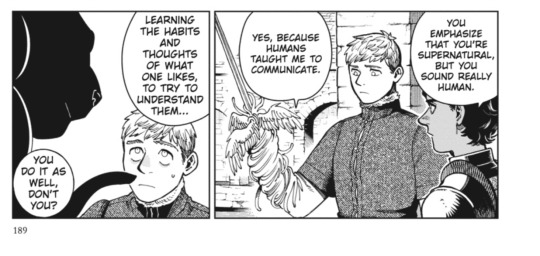
Kabru is a character who devotes a huge amount of time and effort to understanding people, and he is very good at it. In his internal monologue, we can tell how advanced and complex his skills of analysis are. He is able to read a huge amount of information just from looking at people's faces and body language.


People are, to him, what monsters are to Laios. This is something that's been expanded on at length in other, excellent meta. It's the fact that they're foils; it's the fact that Kabru is also very easy to read as autistic, with a special interest which is the opposite and parallel of Laios'. It's something that came out of trauma and alienation, as Laios' special interest in monsters also began as a coping mechanism.
The complicated origin of this "love" for monsters and for people comes through, I think, in the fact that one of the places we see both characters use their fixation is in being very, very good at killing the thing that they love. This also ties into the idea that loving something isn't even remotely mutually exclusive with using it to sustain your own survival; using it for your own purposes; hurting it or killing it. Love can be, and often is, violent, possessive and consumptive. This understanding is part of what makes Kui's depiction of interpersonal relationships so compelling to me.
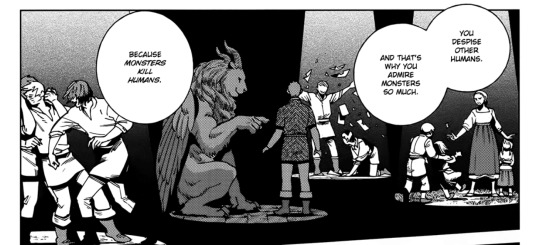
While Laios fixated on monsters and animals to seek a place of escape, in both his imagination and his self-image, from the humans who he couldn't understand and who couldn't understand him, Kabru seems to have fixated on understanding people in order to navigate the complex, socially marginal places that he has been forced into throughout his life. As an illegitimate child raised by a single mother with an appearance that marked him out as different to the point his father's family wanted to kill him, and a tallman child raised among elves who didn't treat him as fully human and wanted him to perform gratefulness for that treatment – treatment that, after he met Rin at age 9, he certainly always understood could be a lot worse – his ability to work out what people wanted from him, whether they were friendly or hostile or had ulterior motives, wasn’t just an interest. It will have been an essential skill.
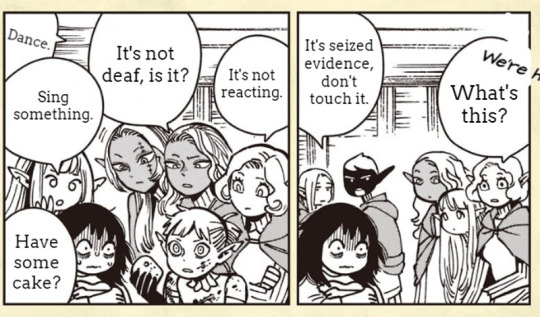
Milsiril, I think, was a flawed parent who tried to do her best by Kabru and did a lot of harm to him despite her best intentions. She may have treated him much better than an average elf would have, but like Otta and Marcille's mother, there are other elves with different outlooks on short-lived races. How would they judge her treatment of him? We don’t have any insight on what it could be, but to be honest, the person’s whose opinion of her I’d be most interested in knowing is Rin’s.
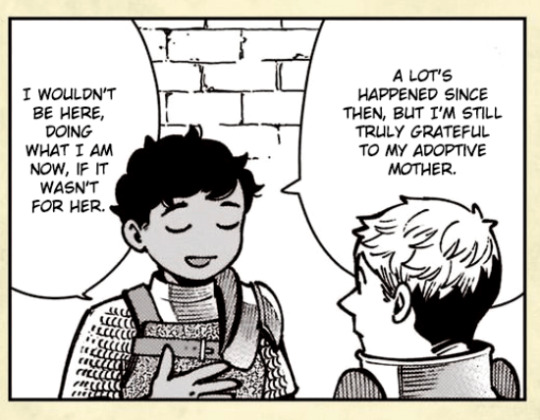
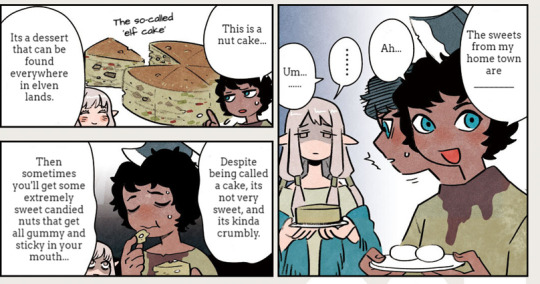
But even if she'd been perfect, living as an trans-racial adoptee in a deeply hierarchical nation with a queen who is a 'staunch traditionalist' who wouldn't even acknowledge the existence of a half-elf like Marcille (according to Cithis) is an experience that would deeply impact anyone.
Elves & Impossible mutual understanding
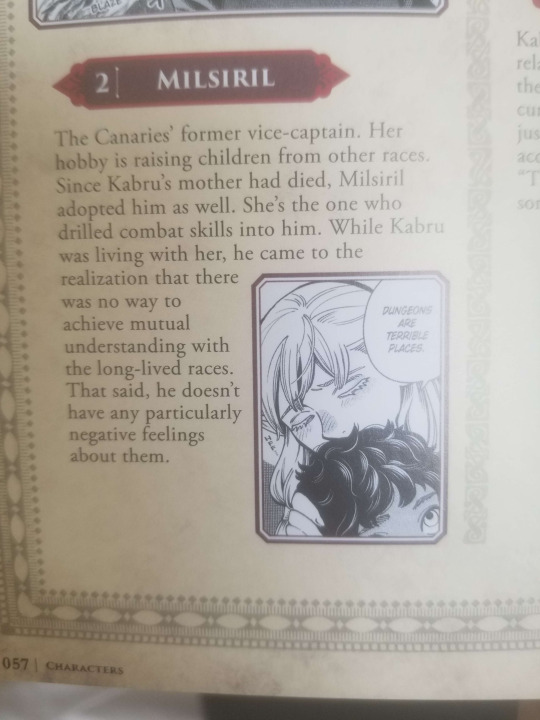
While Kabru was living with Milsiril - in other words, while living in the Northern Central Continent - he came to believe that "there was no way to achieve mutual understanding with the long-lived races."
This is evident in his political project: he wants short-lived races to have ownership over the dungeon's secrets. Despite his dislike of the Lord of the Island, he's a useful bulwark to stop the elves taking over. Despite his doubts about Laios, Laios needs to be the one to defeat the dungeon, because if he doesn't the elves will take over.
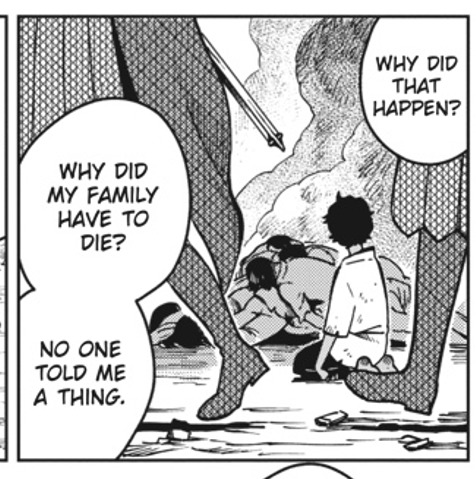
Kabru still carries a deep scar from Utaya, one that was exacerbated by the fact that he never got an answer to any of his questions about what happened or why. This, despite the fact that Milsiril knows about the demon and how it works. Do you think Kabru, with his social perceptiveness that borders on the superhuman, wasn't aware that she knew more than she would tell him?
Given that, the fact that he gets to a place where he "doesn't have any particularly negative feelings about [elves/long-lived species]" .... well, to put it bluntly, I believe that he thinks that's the case, but I kind of doubt it. After all, if he did have resentment, of Milsiril (someone who was his primary provider and caretaker since age six, and who despite her flaws, loves him and who I do think he loves) or of elves (who he has had to play nice with for most of his life, in order to survive, and will still have to play nice with in order to achieve his goals, since they hold all the power) what would that do except hurt him and make his life harder? Kabru is Mr. Pragmatic, so I don't think he'd let himself acknowledge any such feelings he did have. Exactly because he can't acknowledge them, they're well placed to get internalised as beliefs about the Fundamental Unchangeable Nature of the World.
However, these stated beliefs seem to contradict his actions. Despite his belief in the impossibility of forming a mutual understanding, he certainly seems to try to understand long-lived people, just as much as he does short-lived people. There's no noticeable difference between his treatment of Daya & Holm versus Mickbell & Rin that isn't clearly down to their relationship with him. His skills of human analysis were honed and developed while living amongst elves, and as soon as he's alone with Mithrun he immediately sets to understanding him - his interests, his motivations, his needs, and his past.
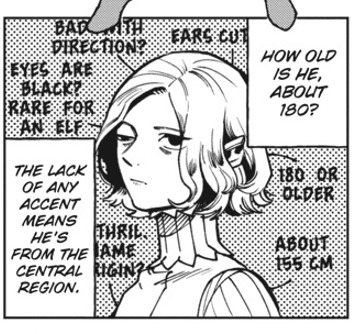
He treats him considerately and without bias, and despite the fact that Mithrun conquering the dungeon for the elves is both a reenactment of a core part of his childhood trauma and a political disaster for his aims, that doesn't seem to colour his perspective on Mithrun negatively at all.
This is something I find extremely laudable about Kabru, and it's another way he parallels Laios. He seems to understand that people, as a rule, (in Laios' case, he understands this about monsters - and eventually, all living beings) will act in their own interests, and if those interests conflict with yours, might harm you. But that's just their nature, and it's not something that should be held against them; you're also doing the same thing, after all. The crux of Laios' arc is precisely that he has to accept the responsibility of hurting someone else in order to achieve what he wants.
Kabru is deeply concerned with his own morals, what he should and shouldn't do, but mostly in the context of responsibility for the consequences - a responsibility he takes onto himself. He isn't scrupulous about what he needs to do in order to create the outcome he wants, but if he fails to create that outcome, then....
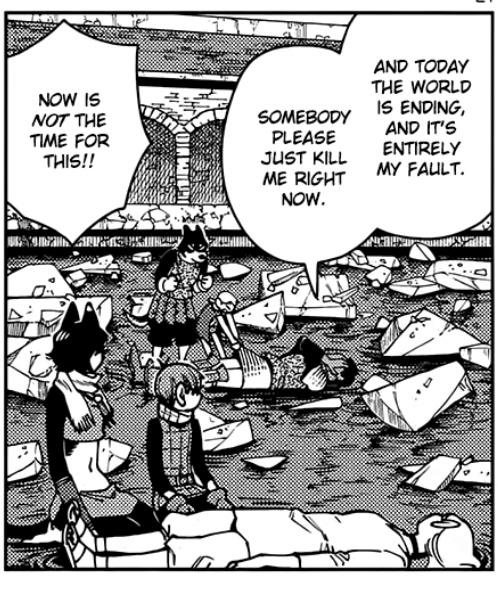
He blames himself to the point of thinking he should die. He doesn't blame Laios, or seem at all angry with him, despite concluding he should have killed him to prevent this outcome. That's because in his eyes, ultimately Laios was going to act according to his own nature, and it's Kabru's fault for not understanding that nature well enough. He's extremely confident in his ability to understand and predict others, (including elves and other long-lived people). Then, where does his conviction that mutual understanding is impossible come from?
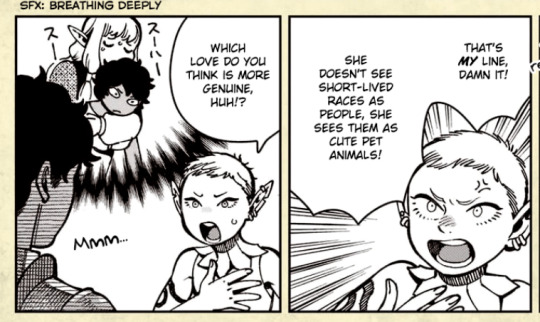
Partially, it's the "mutual" part. I'm sure Kabru, who isn't able or willing to deny Otta's insinuation that Milsiril saw him more like a pet than a son, has felt that his full interiority, the depth of his feelings and his ability to grow, act, and think as a fully equal being, was something that the elves around him just couldn't grasp. Because that was their excuse for it, he came to understand this as a gulf between short-lived and long-lived beings, an inevitable difference in outlook caused by their different lifespans.
This experience might be part of what leads to his iconic “fake” behaviour. He trusts his ability to understand others, but if they aren’t able to understand him, then there isn’t any benefit to being honest about his feelings and thoughts. If his attempts to reach mutual understanding with his caretakers were never able to be fulfilled, then it isn’t any wonder that he reacts with such surprise and horror at blurting out his desire to be Laios’ friend.
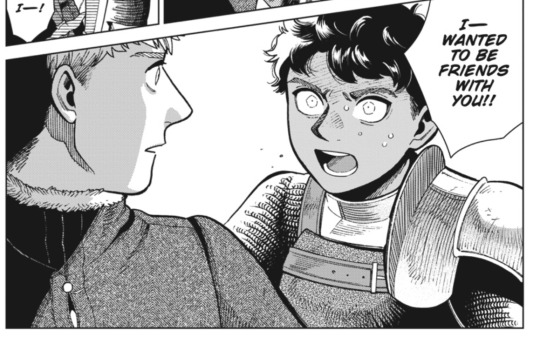
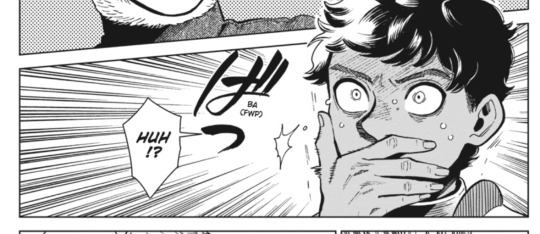
In his experience, making yourself vulnerable in that way only leads to being hurt. Soothing him, hushing him, lying to him, talking to him like a child that isn’t able to use proper judgement – that’s an inadequate and deeply hurtful way to respond to genuine distress, the desire for autonomy, or disagreement. Ultimately, I think that’s why he comes out on the side of being grateful to Milsiril; because she did equip him with the skills and knowledge he’d need to reach his goal, and let him go.
Though he could understand them, they couldn't understand him. To the extent that was true - which I'm sure it was - it wasn't due to anything about lifespan. It was due to the elves’ racism, and the solipsitic mindset & prejudiced attitude that it caused them to approach him with.
Because, if it needs to be said, the idea that there is an unbreachable gap in understanding between the long-lived and short-lived species is not true. Marcille and Laios have a much greater difference in lifespan than any full elf from any short-lived person, and they’re able to understand each other – maybe not perfectly, but better than many other people who are closer in life-span to them.
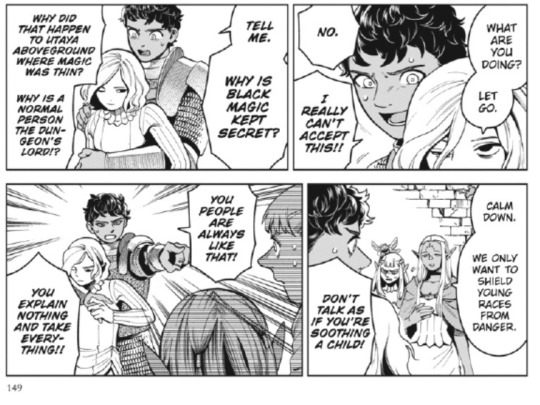
That doesn’t mean that I think Kabru is wrong about this, however. Because there’s an interpretation of his statement that is reflected in his actions and is true. When he talks about his problem with elves, it’s not just their attitudes: it’s their power, and what they use it to do. They “explain nothing and take everything”. Though it’s presented in the guise of ‘guiding and protecting’, in fact it’s a simple case of a powerful nation using their military power, wealth, access to resources, and historically stolen land – including the island itself – to protect their own interests and advance their own agenda. That’s why they’d be able to show up, seize the dungeon, and forcibly take Kabru’s party and Laios’ party to the West. If Kabru wants to stop that from happening, or change that status quo, persuasion or a bid to be understood would be completely pointless. Between the political blocs formed by long-lived species and the interests of short-lived species, “mutual understanding”, given their current, unequal terms, would be impossible. This is something that we see reflected in Kabru’s actions; before he asks his questions about the dungeon, he grabs Mithrun as leverage. He never really attempts to persuade the canaries to see his point of view, because that would be pointless: they’re agents of the Northern Central Continent’s monarchy, and will act in its interests regardless of any individual relationship with him.
I don’t think Kabru sees the different dimensions of this belief of his in quite such clear terms, however, as is evidenced by the other group who he thinks it’s impossible to communicate with.
Demi-Humans & Unknowable Objects
The other place that we see his conviction about the impossibility of mutual understanding is in the kobold extra.
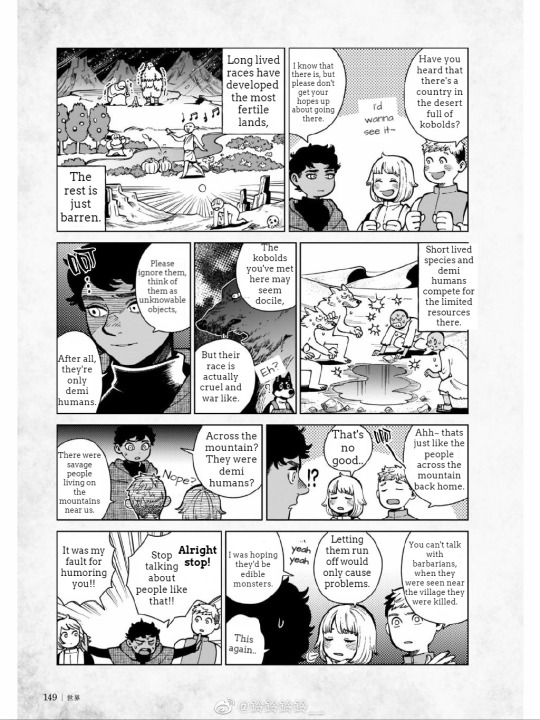
I'm including the whole thing, because I think it's an excellent and clever piece of world-building. Aside from what it says about Kabru, which I'll expand on shortly, what this extra does is deconstruct and call into question the usual "fantasy ontological biology" present in these sort of DnD-like settings. Essentially, the kind of worldbuilding where a race (such as kobolds) can be described as war-like, and that's establishing something essential about their biological nature. That's common to the point that if Kui didn't include this, some people would probably come away thinking that's the case about, e.g., the orcs.
But here, despite what Kabru is saying, the information the reader actually gets is:
the conflict between short-lived humans and demi-humans such as kobolds is mostly over access to material resources that they need to survive.
These resources are scarce because powerful nations, such as the elves, have monopolised them.
Kabru, who has grown up in a place at the centre of these conflicts, ascribes essential, negative traits to a cultural group which was in direct conflict with his own. Communication with this other group is impossible; they aren't people, they're more like objects.
oh yes! just like this conflict between groups of tall-men, a conflict which the reader will immediately interpret as more clearly analogous to real-life racism. Our other protagonists also carry prejudices from growing up in a place where a marginalised group was in conflict with the dominant group over scarce resources. It's definitely impossible to communicate with these people, and you can only kill them.
Woah, when you say it like that, it sounds pretty bad!
But also, nobody walks away having had a realisation or unlearned their prejudices - because they don't have the tools they need to do that work. Yet. I do think, to an extent, it could happen - especially with Kabru, since it's suggested in the epilogue that Melini might become a safe-haven for demi-humans.

To focus in on Kabru, the key here is his statement that you should think of demi-humans as "unknowable objects". Even his extraordinary powers of understanding have seemingly hit a limit. Part of this is just inherited prejudice, and doesn't need to have a complicated psychological explanation, any more than the elves who were prejudiced against him need one.
But also... this is probably somewhat linked to the way demi-humans seem to be considered "pseudo-monsters". They're the place that the strict delineation between the human and the monstrous is permeated. Laios, who is not interested in humans, remembers and is excited by Kuro. Chilchuck and Laios argue over whether it's OK to eat a mermaid. Kabru's prepared to (pretend to) roll with the idea that Laios ate the orcs.
But these are people, aren't they? Of course, this is a social construction, as we see from the fact that in the Eastern Archipelago, the label of "human" is reserved for tallmen, but in most of the rest of the world it depends on some obviously arbirary classification based on number of bones; "demi-humans" aren't in any essential way monstrous, except to an extent in their appearance, and physical location - due to their marginal social status, they're pushed out to live in unsafe places such as dungeons.
Therefore, Kabru's view of demi-humans as fundamentally "other", unable to be understood - monstrous - could be read as akin to abjection, the psychoanalytical concept described by Julia Kristeva. In order to create a bounded, secure superego, that thing which permeates and calls into question the border between self and other, human and animal, life and death, is rejected and pushed to the margin.
“Not me. Not that. But not nothing, either. A "something" that I do not recognize as a thing.[...] On the edge of nonexistence and hallucination, of a reality that, if I acknowledge it, annihilates me. There, abject and abjection are my safeguards. The primers of my culture.” (Kristeva et al., 1984, p. 11) “It is thus not lack of cleanliness or health that causes abjection but what disturbs identity, system, order. ” (Kristeva et al., 1984, p. 13) “The pure will be that which conforms to an established taxonomy; the impure, that which unsettles it, establishes intermixture and disorder. [...] the impure will be those that do not confine themselves to one element but point to admixture and confusion.” (Kristeva et al., 1984, p. 107) (discussing food prohibitions in Leviticus)
This is both (due to its affinity with food-loathing and disgust) a very fruitful concept to apply to dunmeshi, and a psychoanalytical theory which I wouldn't exactly cosign as True Facts About Human Psychological Development. You may also know the abject from its utilisation in the classic essay "Horror and the Monstrous-Feminine" by Barbara Creed - that's a lot more approachable than Kristeva if anyone's interested.
Key here, though, is that through the symbol of the "demi-human" is embodied a step between "human" and "monster" - and that's a prospect that puts at risk the whole notion of an absolute separation between those two categories in the first place. To Laios, that's something wonderful, and to Kabru, it's terrifying. We can see this principle further embodied in the relationship both characters have with the notion of becoming monstrous.
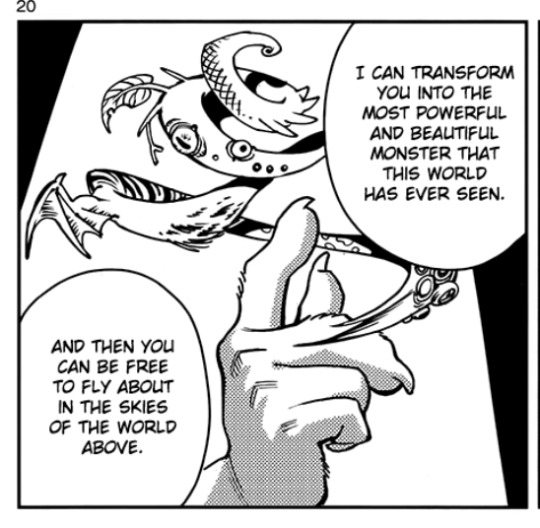
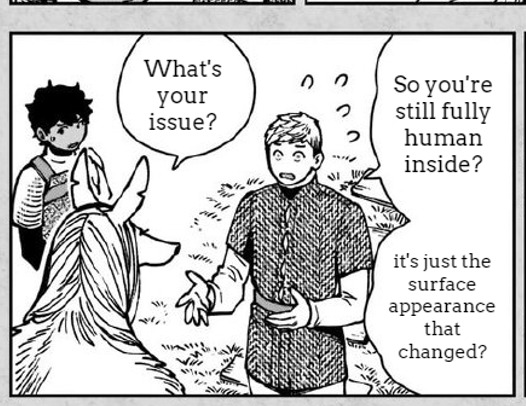
To Laios, this is transcendent, and represents a renunciation of everything human - in fact, if it didn't, it wouldn't "count".
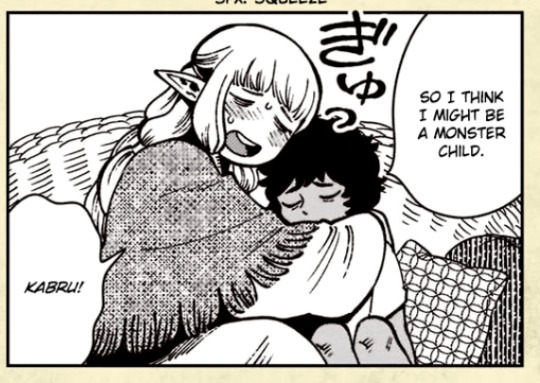
To Kabru, it's a deeply-held fear, established by his childhood alienation (due to his illegitimacy, his eyes, and perhaps also his neurodivergency), deepened by monster-related trauma and the sense of responsibility and survivors guilt he feels for what happened at Utaya. His identity as a human who is not monstrous is key to his sense of stability and safety; he doesn't want to touch monsters, he doesn't even want to see them.
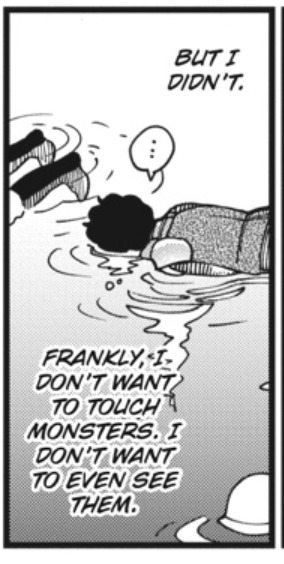
To acknowledge a kinship, a possibility of similarity between the things he loves (humans) and the things he hates (monsters) would be more than touching them - it would be putting them inside him. We know, quite explicitly, that this notion is triggering to Kabru. He literally has what seems to be a flashback when he's about to eat the harpy omelette.
So he abjects it, classifying the demi-human as fundamentally unlike him - an unknowable object, or an object that he refuses to know. Because in understanding it, he would interject the things he hates and fears into his self, which is already, always under threat by that hated and feared object.
Of course, again, Kabru isn't very good at enacting this refusal in practice. For one, when he chooses between his desires and ingesting the feared object, eating monsters... he eats monsters. Part of this is treating himself badly, the "ends justify the means" mentality. His goal is to destroy all monsters, so if he needs to become monster-like to do that, he will. But part of it is also the other motivation that he didn't even seem to know about until he said it: he wants to become Laios' friend, and to learn from him how a person can like monsters. He wants, at least in some part of him, to reconcile the feared and hated object into something he can understand.
For another:
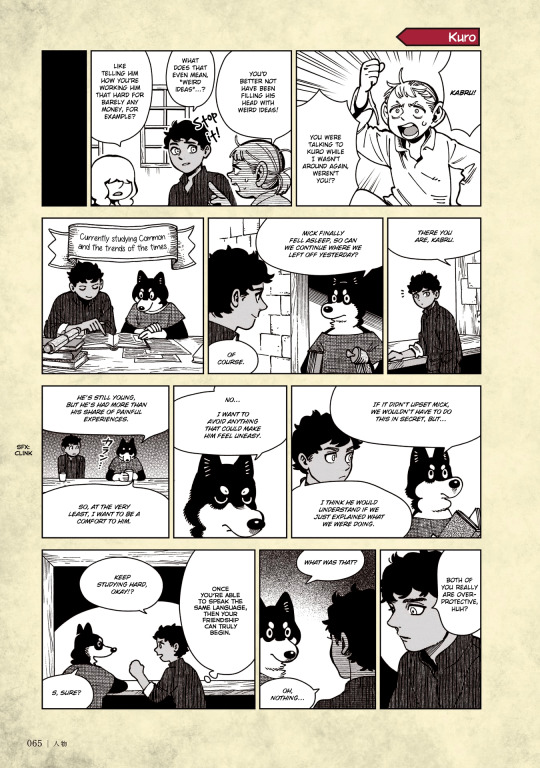
Kabru can speak the kobold language. In the first place, while this may have been common in Utaya, it also could have been something he chose to learn, an early expression of his interest in understanding and talking to all sorts of people. It isn't the kind of thing you learn if you believe that communication between yourself and the group that speak it is impossible, is it?
It's possible to harbour prejudices against a group while being kind to an individual, and given Kabru has those prejudices regardless of his reasons, that is what he is doing. But also, his treatment of Kuro doesn't reflect a sincerely held belief that he's an "unknowable object" at all. His approach is exactly the same as it is to any other person: an analysis of goal and motive, and an attempt to help if he's sympathetic and their goals align - going out of his way to give language and local knowledge lessons in secret. His conviction that Mickbell and Kuro will truly become friends when they can properly communicate is completely contradictory to any sense of demi-humans as fundamentally different, or impossible to reach mutual understanding with. To me, it seems like this self-protective shield against the corruptive force demi-humans as an idea present to his identity, this abjection, when Kabru is face-to-face with one, just simply can't hold up against his finely honed skill of intellectual empathy. Perhaps because he's autistic, it seems his "empathy" is less an emotional mirror response, and more a set of cognitive skills for analysis of others. That instinctual, emotional empathy might not trigger when presented with a member of an out-group, but if it’s possible for Kabru to turn his cognitive empathy off, we don’t see him do it.
This isn't to say that this prejudice doesn't affect his behaviour. For one, it could negatively impact his judgement of politics and policy, where individual people don't enter into it. For another, I'm not convinced he'd be willing to overlook Mickbell's exploitative relationship with Kuro if Kuro wasn't a kobold. As it is, since both of them are satisfied, he doesn't feel like he needs to intervene, regardless of the fact Mickbell isn't paying Kuro. But if Daya and Holm were in a relationship, and Holm took both Daya's and his own share from their ventures, but only compensated her in living expenses and kept the rest, do you think he'd tolerate it, for example? Even if she said it was OK?
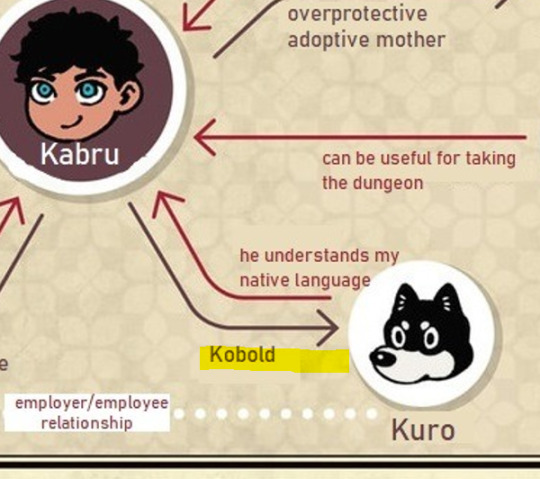
Conclusion

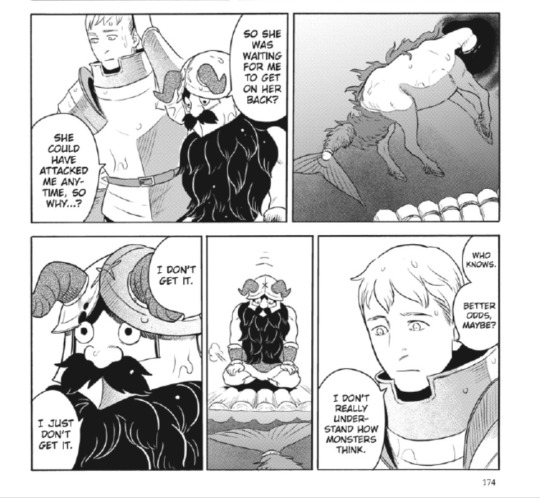
The kelpie chapter establishes that "people can never know what monsters are really thinking." That isn't just true of monsters, though.
True mutual understanding is impossible - between anyone. We can never truly understand another person's heart. This is touched on in, for example, the existence of shapeshifters and dopplegangers. Even a monster that seemed like a perfect copy of a person wouldn’t be that person, and wouldn’t be a satisfactory replacement.
We’re intended, I think, to understand the winged lion's repeated suggestions to just replace people who have been lost with copies as something uncanny, which demonstrates the way that the winged lion never manages to attain a complete understanding of humans. A version of a person who was created to fulfil your memories of them, to be the person who you wanted them to be, would be a terrible, miserable thing.
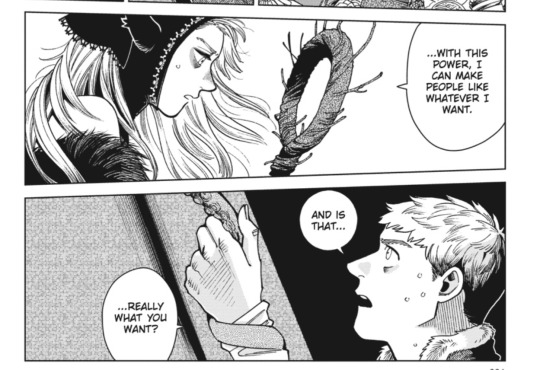
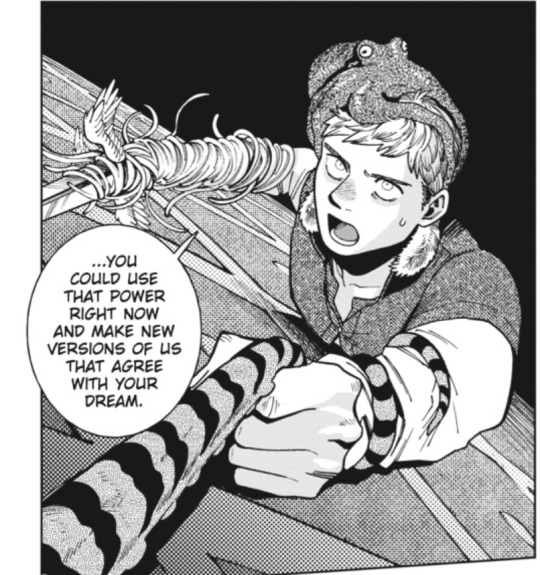

Disagreeing, coming into conflict, and misunderstanding each other, are essential parts of what it means to be living beings, as fundamental as the need to eat.
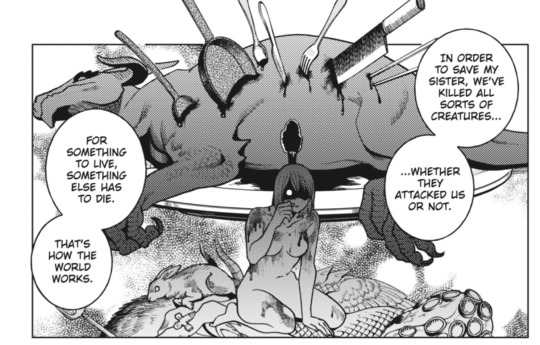
The only thing to do is not to take more than you need to eat to survive, and not impose your own desires onto others. To do your best to sincerely communicate your desires, even if they're embarrassing or vulnerable or strange, like Kabru eventually does with Laios; like Laios does, bit by bit, with the people around him; like Marcille does, Chilchuck does, Senshi does... to hope they will accept you, and do your best to understand them in return.
We can re-examine, in that context, Kabru's line about the elves' tendency to "explain nothing and take everything".
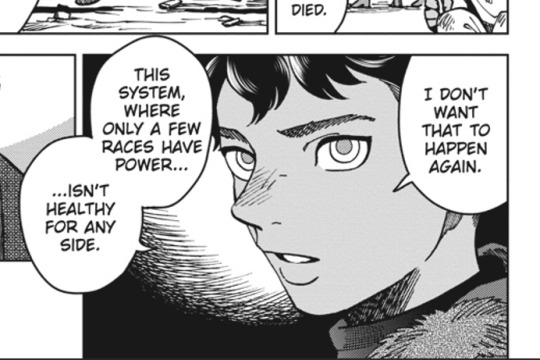
They have the power to impose their preferred "menu" onto less powerful groups. And in that context, mutual understanding being impossible just means that they won't give up their power because they're asked nicely. Kabru's goal is to seize the truth that they won't give to him, and to create a situation where they can't take everything. Because he's accurately surmised that nothing about the treatment of short-lived races will change so long as the power imbalance remains. Despite the way he mistakenly ascribes part of that to "long-lived vs short-lived" or "human vs demi-human", the actual gulfs in understanding he identifies are structural, are about power and about access to material resources and safety.
I think he could come to recognise this. Yaad is teaching him political science after all, and while a prince's lessons on political science won't exactly get at much that's radical or invested in the interests and perspectives of the marginalised (Capital is a critique of for a reason after all...) I believe in Kabru's ability to learn critically and get more from a lesson than it was intended to teach.
#og post#kabru of utaya#kabru dungeon meshi#laios touden#dungeon meshi meta#dungeon meshi#dunmeshi#dungeon meshi manga spoilers#dungeon meshi analysis#kuro dungeon meshi#the canaries#milsiril#continuing to develop my kabru theses.#literally sitting and thinking about kabru all day. rotating him.#he's in the microwave. to me.
2K notes
·
View notes
Text

New today from IGN: 'Dragon Age: The Veilguard's Devs Reveal New Info About Each of the Companions (and Solas and Varric, Too)'
It turns out The Veilguard really is the friends we made along the way.
Intro:
"Friendships, romantic relationships, and everything in between have always been an integral part of not just the Dragon Age series, but of BioWare in general. From Mass Effect’s Garrus Vakarian to Dragon Age’s Varric Tethras, the characters – and how they get along with the player – are inseparable from titles from the studio. But, perhaps more than any other BioWare game, Dragon Age: The Veilguard is leaning in heavily on this idea, as it’s already easy to see from the marketing material. For one, the name changed from Dragon Age: Dreadwolf back in June, with BioWare general manager Gary McKay telling us at the time that it was out of a desire to shift the focus to a “really deep and compelling group of companions.” That would be followed by a first official trailer at Summer Game Fest that put the focus squarely on seven new companions that will be tagging along with the player character, Rook, in The Veilguard. With all that in mind, it’s little surprise to hear game director Corinne Busche talk about how these companions aren’t just central to the story of The Veilguard, but the gameplay and combat as well. “Building a relationship with companions has always been a staple of Dragon Age, but this time around, that relationship translates into how well you work together as a team,” Busche tells IGN. “It is how you're actually going to level up your companions, by getting to know them better. That's how you're going to unlock skill points. So when you look at all of the various abilities the companions have, there's inherent combos and synergies and roles that they'll have on the battlefield.” She uses the example of Neve, the mysterious detective mage who has a wildly useful special ability to slow time in combat. “But if I really get the opportunity to know her,” Busche explains, “whether it's platonic or romantic, I'm going to help be able to shape her skills and augment those abilities that work really well with my own personal build, so our sense of teamwork really deepens.” During our time with the game, IGN got to see some of this in action; unsurprisingly, Dragon Age: The Veilguard has an approval/disapproval system, with pop-up text on the side of the screen indicating whether or not a companion liked what Rook just did or said. But something new in this Dragon Age: even just completing a quest with a companion in your party increases your “bond” with them, whether they agree with how you handled things or not. Your relationship, Busche says, isn’t necessarily about “how much they like you, but how well you get to know them.” “This is about a found family,” Busche tells us. “That is, they have the same goals, different complications in their life, but they're all giving everything they have to defend Thedas. You're going to get to know them really well. You're going to develop trust, understanding. That doesn't mean you're always going to agree.” But, we’ll have plenty more to say about the game systems and combat later. With Busche, we had the opportunity to really dive into the seven companions at the center of The Veilguard and what they’re all about. Here’s what she had to say about each one:"
"DAVRIN Busche: “When we were thinking about Davrin, how we were going to develop him as a character, we had to think about, 'How is he going to show up on the battlefield?' And it was unique because he has this, I guess you could say, companion of his own, the griffon Assan. That makes him, as a companion, very unique, because Assan shows up on the battlefield. So we had to think about how that integrates into his abilities, where Davrin as a Grey Warden is capable on his own, but also, when does he call upon Assan and what does that look like? What happens if you're indoors?... And indeed, when you're doing some of Davrin's content, just seeing Assan gliding through the environments, you really get a sense that they care and they're protective about each other. “…When we think about Davrin and his being the representative of the Grey Wardens within the team of The Veilguard, it was an opportunity for us to really go back to some of those roots that we know our fans, our players, deeply care about. Dragon Age: Origins, of course, was so Grey Warden-forward. We want to evoke those memories, those connections that our players have. And I absolutely love when you're journeying with Davrin, not only his aesthetic, how he carries himself as a Warden, but how he interacts with his fellow Wardens. The little wrinkle of, 'Hey, there actually are some griffons remaining in Thedas,' how he learns as a Warden to train and interact with these griffons that, to our knowledge, haven't existed for quite some time, it's a learning experience on a lost art of the Grey Wardens that is really unique to Davrin's character.”"
"HARDING Busche: “To talk about Harding as a companion, I guess I'd have to go back to Inquisition. Of course, Harding showed up. She was your scout on the field. There was a light romance with her, and I think one of the things that the team didn't quite expect is how much Harding would catch on in Inquisition. Players fell in love with her, and we heard them. They wanted a deeper romance, they wanted more engagement with Harding. So for the team, I felt like it was kind of a no-brainer for us to bring back Harding, and we also wanted to reestablish that connection to the Inquisition in the world of Thedas, which occurred 10 years ago, the events of Inquisition. “Harding serves as our proxy back to those events, and you get to learn about what's happened with the Inquisition since, so she presents some really lovely opportunities for us. I will say, personality-wise and her role on the battlefield, she is among my favorites. When you see her leap into the air, unleashing these devastating attacks with her bow and arrow, I just can't get enough of her.”"
"TAASH Busche: “Taash, in the creation of their arc, is one of our more complex characters. It's a journey along their arc that is about introspection. 'Where do I belong in the world? What are my boundaries? What do I fight for? How do I become at peace with who I am?' So I love the juxtaposition, actually, between Taash's personal journey and this imposing literal dragon slayer, that sort of hard exterior and really gentle interior. It makes Taash a really special companion for me.” (When asked which companion had the steamiest romance): “I'll just speak for me personally, but at the culmination of the romance arcs, I'd have to say Taash. When I got to that scene and saw the finished version of that cinematic, I was hollering. Hollering.”"
"EMMRICH Busche: “The thing about Emmrich that is going to surprise our fans the most is his relationship with necromancy. I really love that we kind of turned the idea of a necromancer on its head here, where you think of them as these conjurers of evil, the certain malice when you hear the term 'necromancer,' but it couldn't be farther from the truth for Emmrich. There is a reverence about the dead. He has a unique relationship with death. You get to explore how he ended up in the Mourn Watch. Death has shaped this character in all aspects of his life, and we frequently refer to him as our gentleman necromancer. I think his proper, kind nature stems from that respect that he's learned about this cycle of life and death throughout his life. “Manfred is like a son to Emmrich. He very much has an affinity for this wisp, this life force that he's given a second chance through this skeletal body, and in many ways, it's the story of a parent raising a child. Emmrich, he needs to teach Manfred and help him along to develop as a character of their own, things like learning new skills, how to assist The Veilguard. Some of our most charming moments are in dealing with Manfred, and I must say I absolutely love the interactions. They just have me rolling whenever Manfred steals the show. “…In my last playthrough, I romanced Emmrich. What I also loved is as I'm synergizing with him as we're doing combos, just having him refer to me as ‘my dear’ on the battlefield. ‘Well done, my dear!’ It just fills me with joy every time.”"
"LUCANIS Busche: “The character that went through the most changes [throughout development] without a doubt was Lucanis. Lucanis is very complex. He's an assassin. He is very skilled in the art of death. The Antivan Crows, they pursue these contracts with a certain level of dispassion, but also, Lucanis is a romantic, and he's dealing with some internal struggles. He's been through a lot of trauma. He's relearning how to trust. And all of those elements come together with a richness, but it creates a lot of complexity in how we tell that story. So I'd say Lucanis is the first one that comes to my mind in terms of the thought that's gone into it, where we've had to make adjustments to really cover all facets of his character.”"
"NEVE Busche: “Neve is our confident noir detective. I love to bring her onto the battlefield because she's just so incredibly capable. She's our ice mage, so really big on controlling the battlefield, and that's actually a good metaphor to her arc. She wants to fight for change. She wants to fight for a better Minrathous, and she's going to use all the tools at her disposal to try and reshape Minrathous into a better place for all. She's very much a Shadow Dragon. This is among the mantra of the Shadow Dragons. They operate from the shadows, fighting for a better Minrathous. So as this accomplished ice mage, she's fierce. She's not going to shy away from any challenge, whether it's taking down darkspawn or dealing with the Magisterium in Minrathous.”"
"BELLARA Busche: “Oh, my dear, sweet Bellara. I relate to Bellara a lot. She is joyous. She's been through a lot, but she remains curious, optimistic. She's kind of a geek. She really likes her fiction. She fangirls over Neve a little bit. She's just so relatable, and I think that's what our players will find and fall in love with when they get to meet Bellara, is just how much you'll recognize some of those patterns and sensibilities that she holds, but don't let it fool you. She is also a Veil Jumper. She's very comfortable in elven ruins. I frequently bring her with me in my party. I like to play rogue. I like to play the Veil Jumper, or the Veil Ranger. Bellara's a fantastic companion to set up that spec with electric vulnerabilities, so I love her both on and off the battlefield.”"
Bonus rounds:
"SOLAS Okay okay, so Solas isn’t technically one of your core companions who will travel with you, but given his place in the Dragon Age story, we still had to ask about his relationship with Rook. Here’s what Busche had to say: Busche: “Rook's relationship with Solas is a complicated one. Everyone has seen, at this point, the gameplay reveal and the opening moments of the game, so you'll know things got shaken up pretty radically for Solas already. He's trapped. He's basically communicating with you as an advisor, and I absolutely love that idea of, ‘He's your lifeline right now, but can you trust him?’ And those touch points with him, ‘Do I take his advice or not? Can he be trusted? Is he going to betray me?’ All the while giving you this information that you absolutely need in order to be successful. “It creates an interesting stage for us, where, I think our fans will agree, Solas is very complicated. He firmly believes he's doing the right thing, and some of our fans will agree that he's trying to do the right thing. Others will not, and this creates a stage for you, the player, where you get to lean into those tendencies of your own as you're taking advice from Solas throughout parts of the game. I think those really interesting debates about, ‘Was he ever redeemable? Can he be trusted? Was he wrong all along?’ You're really going to be able to dive in deep on that.”"
"VARRIC Varric, while a part of Dragon Age: The Veilguard and a series mainstay, isn’t part of your core companions either. But, as fans can see in the trailers, he’s still very much in The Veilguard, so we asked Dragon Age creative director John Epler about how he’s changed since we last saw him in Inquisition: Epler: “Since the events of Dragon Age: Inquisition, he has spent the time, just briefly, obviously, [serving as] Viscount of Kirkwall. I mean, anybody who knows much about Varric knows how well a job where he sits around and tells people what to do is going to sit with him. He has been participating in the hunt for Solas. And I think for Varric in particular, that's a very difficult thing for him to do because Solas is his friend. Solas is somebody that he grew close to over the events of Inquisition. They adventure together, they work together. “And now knowing who Solas really is, that eats at Varric. Because Varric always sees, Varric believes he can always make somebody do the right thing. Varric believes he is the most convincing, charismatic, because he cares about people. And he has this belief that as long as I get a chance to talk to Solas, I'm going to be able to turn him. But as he's seeing what Solas' ritual is doing to the world around him, as he experienced in the comics, Dragon Age: The Missing, that eats at him a little bit. That's challenging his world view of him as always being the best judge of people, being able to see that somebody is able to be redeemed. And he's starting to question a little bit, ‘am I right or am I being a fool by believing in Solas?’ ”"
[source]
#dragon age: the veilguard#dragon age the veilguard spoilers#dragon age: dreadwolf#dragon age 4#the dread wolf rises#da4#dragon age#bioware#video games#solas#long post#longpost#dragon age: the missing#dragon age: tevinter nights#mass effect#garrus vakarian
697 notes
·
View notes
Text
ISAT and Ludonarrative Harmony: Combat is a Storytelling Tool
Or: How Siffrin is stuck in the endgame grind, forever
Please Note: This is primarily aimed at an audience that already played In Stars and Time, because I am bad at explaining things, and it's good to already know what the fuck I'm talking about. I tend to only bring up game elements as I want to talk about them.
Spoilers for.... all of ISAT! Especially Act 5!
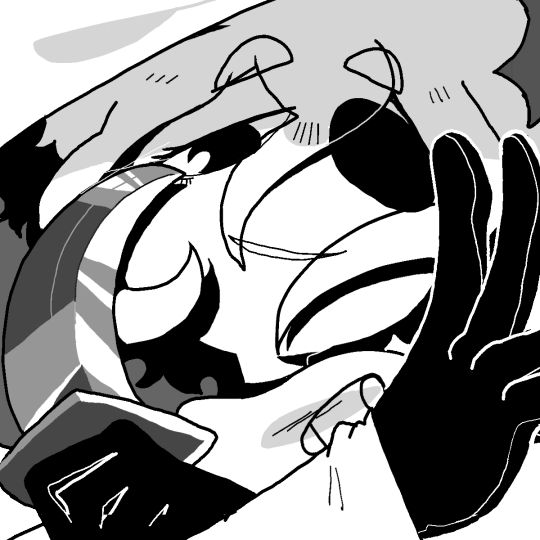
(image to show how i feel posting this and as an attention grabber over my wall of text)
To pull a definition of ludonarrative harmony out of a hat, game writer Lauryn Ash defines it as follows:
Ludonarrative harmony is when gameplay and story work together to create a meaningful and immersive experience. From a design implementation perspective, it is the synchronized interactions between in-game actions (mechanics) and in-world context (story).
It is, generally speaking, how well game mechanics work hand in hand with the story. I, personally, think ISAT is an absolute masterclass of it, so I want to take a look at how ISAT specifically uses its battle system to emphasize Siffrin's character arc and create organic story moments. I want you to keep this in mind when I talk here.
So, skills, right? If you've played any turn-based RPG, you know your Fire spells, your "BACKSLASH! AIRSLASH! BACKSLASH!" and the many ways to style those.
Well, what does casting "Fire" say about your character? Not all that much, does it? Perhaps you'll have typical divisions. The smart one is the mage, the big brawny one is your tank, the petite one's the healer. And that's the barebones of ISAT's main party, but it's much more than that.
Every character's style of combat tells you something about them. Odile, the Researcher, is the most well-travelled and knowledgable of the bunch. She's the one with the expertise to keep a cool head and analyze the enemy, yet also able to use all three of the Rock-Paper-Scissors craft types.
To reflect her analytical view of things, all her skill names are just descriptive, the closest to your most bog-standard RPG. "Slow IV" or "Paper III" serve well to describe their purpose. The high number of the skills gives the impression there were three other Slow skills beforehand - fitting, considering the party starts at level 45, about to head into the final dungeon. She's also the oldest, so she's the slowest of the bunch.
Isabea, the Fighter, has all his skills in exclamation points. "YOUR TURN!!!" "SO WEAK!!!" "SMASH!!!" they're straightforward, but excited. He's a purposefully cheerfull guy, so his skills revolve around cheering on his allies. He's absolutely pumped to be here, and you see that from his skill names alone.
Mirabelle, the Housemaiden, is an interesting case. She's by all means the true protagonist of this tale - She's the one "Chosen by the Change God," the only one who survived the King's first attack, the only one immune to his ability to freeze time, the only dual-craft type of the game - just a lot of things. And her skill names reflect that facade she puts on herself - she can do this, she can win! She has to believe it, or else she starts doubting. This is how you get "Jolly Round Rondo" and "Mega Sparkle Heal" or "Adorable Moving Cure." She's styled every bit a sailor scout shojo heroine, and her moveset replicates the naming conventions of "In the name of the moon, I'll punish you!"
Even Bonnie, the Kid, who can't be controlled in combat, has named craft skills. And they very much reflect that Bonnie is, well, a kid. "Wolf Speed Technique" or "Thousand Blows Technique" are very much the phrasings of a child who learned one complicated word and now wants to use it in everything to seem cooler than they are, which is none, because they're twelve.
Siffrin's skills are all puns.
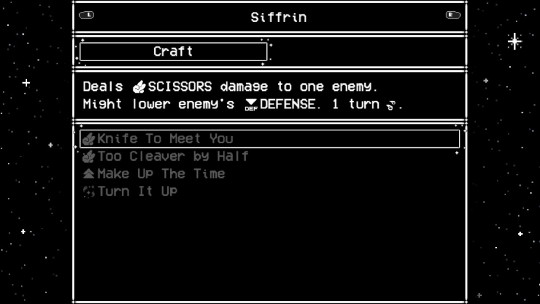
You have an IMMEDIATE feel for personality here. Between "Knife to Meet You!" and "Too Cleaver by Half," you know Siffrin's the type to always crack a joke no matter the situation, slinging witticisms around to put Sonic the Hedgehog to shame. It's just such a clever way to establish character using a game mechanic as old as the entire history of RPGs.
This is only the baseline of the way the combat system feeds into the story, though.
The timeloop, of course, feeds into it. Siffrin is the only character who retains experience upon looping, whereas all other characters are reset to their base level and skills. And it sucks (affectionate).
You're extremely likely to battle more often the earlier in the game you are - after all, you need the experience (for now.) Every party member contributes, and Siffrin isn't all that strong on their own, since they focus on raw scissor type damage with the addition of one speed buff. (Of course it's a speed buff. They're a speedy fucker. Just look at him).
At first, the difference in level between Siffrin and the rest of the group is rather negligible. Just a level or two. Just a bit more speed and attack. And then Siffrin grows further and further apart. Siffrin keeps learning new skills. He gets a healing skill that doubles as an attack boost, taking away from both Mirabelle's and Isabeau's usefullness. He gets Craft skills of every type that even give you two jackpot points instead of one - thus obliterating Odile's niche. Siffrin turns into a one-person army capable of clearing most encounters all on their own.
Siffrin's combat progression is an exact mirror of story progression - as their experience inside the loops grows, they also grow further and further away from their party. The party seems... weaker, slower, clumsier. Always back at their starting point, just as all of their character arcs are reset each loop. Never advancing, always stagnant. And you have Siffrin as the comparison post right next to them.
I also want to point out here a change from Act 2 to Act 3 - Siffrin's battle portrait. He stops smiling.
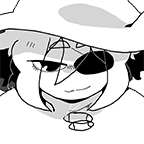
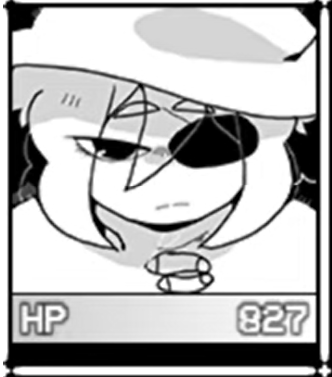
Battles keep getting easier. This is true both for the reason that Siffrin keeps growing stronger even when all enemies stay the same, but also for the reason that you, the player, learn more about the battle system and the various encounters, until you've learned perfect boss clear strategies just from repetition. Have you ever watched a speedrunner play Pokemon? They've played this game so many times, they could do it blindfolded and sleeping. Your own knowledge and Siffrin's new strength work in tandem to trivialize the game's entire combat system as the game progresses.
(Is it still fun? Playing it over, and over, and over again? Is it?)
You and Siffrin are in sync, your experience making everything trivial.
As time goes on, Siffrin grows to care less and less about performing right for their party and more and more about going fast. A huge moment in his character is marked by the end of Act 3; because of story events I won't delve too deeply into, Siffrin has grown afraid of trying something new. And his options of escape are closing in. They need an answer, and they need it fast. He doesn't have the time or patience to dumb himself down, so you unlock one new skill.
It doesn't occur with level up, or with a quest, or anything at all. At the start of Act 4, it simply appears in Siffrin's Craft skills.
(Just attack.)
No pun. No joke. Just attack. Once you notice, the effect is immediate - here you have it, a clear sign of how jaded Siffrin has become, right at every encounter. And it's a damn good attack, too! The only available attack in the game that deals "massive" damage against all enemies. Because it doesn't add any jackpot points (at least, it's not supposed to), you set up a combo with everybody else, but Siffrin simply tears away at the enemy with wild abandon. Seperated from the rest of the party by the virtue of no longer needing to contribute to team attacks (most of the time. It's still useful if they do, though).
Once again, an aspect of the battle system enhances the degree of separation between Siffrin and the static characters of his play. You're incentivized to separate him, even.
Additionally, there are two more skills to learn. They're the only skills that replace previous skills. You only get them at extremely high levels, the latter of which I didn't even reach on both of my playthroughs.
The first, somewhere in the level 70 range, Rose Printed Glasses, a paper type craft skill, is replaced by Tear You Apart. It's still a pun about paper, but remarkedly more vicious.
The second is even more on the nose. At level 80, In A While, Rockodile!, a rock type craft skill, is replaced by the more powerful Rock Bottom.
I didn't get to level 80. If you do, you pretty much have to do it on purpose. You have to keep going much longer than necessary, as Siffrin is just done. And the last skill he learns is literally called Rock Bottom.
What do I even need to say, really.
Your party doesn't stay static forever, though.
By doing their hangout quests, side quests throughout the loops that result in Siffrin and the character having a heart to heart, all of them unlock what I'd call an "ultimate" skill. You know the type - the character achieved self-fulfillment, hit rank 10 on their confidant, maxed out their skill tree, and received a reward for their trouble.
These skills are massively useful. My favorite is Odile's - it makes one enemy weak to all Craft types for several turns, which basically allows you to invalidate the first and third boss, as well as just clown on the King, especially once Siffrin starts racking up damage.
But the thing is. In Act 3, when you first get them, yeah, they're useful. But... do you need them? After all, they're such a hassle to get. You need to do the whole character quest again, you can't loop forward in the House or you'll lose them. If you want to take these skills to the King, you need to commit. Go the full nine-yards and be nice to your friends and not die and not skip forward or skip back. Which is annoying, right?
Well, I sure did think so during Act 4. After all, a base level party can still defeat the King, just with a few more tricky pieces involved. Siffrin can oneshot almost all basic enemies by the time of Act 4. It's this exact evalutation that you, the player, go through everytime you return to Dormont. Do I want this skill, still? Would it not be faster to go on without it? I'm repeating myself, but that's the thing! That's what Siffrin is thinking, too!

I also want to take a quick moment to note, here - all skills gained from hangouts have art associated with them, which no other skills do. This feature, the nifty art, hammers home these as "special" skills, besides just how they're unlocked.
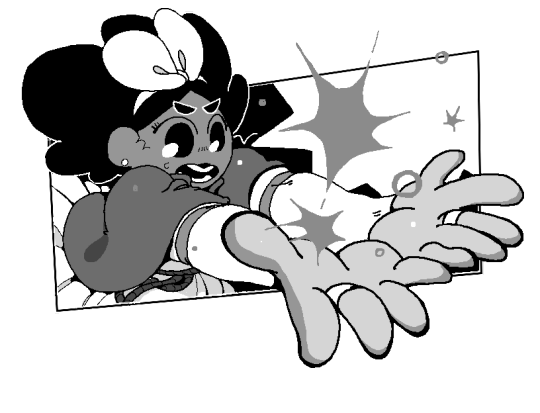
Siffrin also has one skill with associated art.
Yeah, you guessed it, it's (Just attack.)
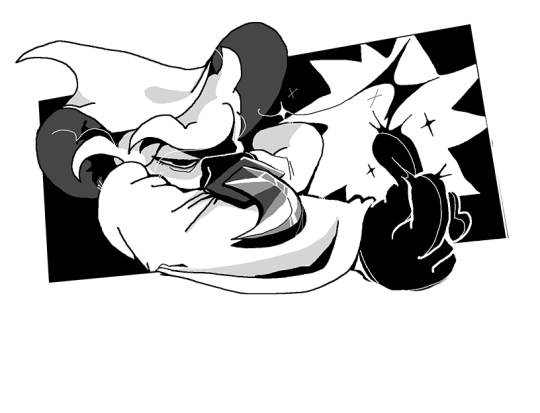
At first, helping the characters is tied to a hefty in-game reward, but that reward loses its value, and in return devalues helping Siffrin's friends every loop. It's too tedious for a skill that'll make a boss go by one turn faster. You, the player, grow jaded with the battle system. Grinding experience isn't worth it, everybody's highest levels are already recorded. Fighting bosses isn't worth it, it's much faster to loop forward.
Isn't this what all endgame in video games looks like? You already beat the final boss, and now... what challenge is left? Is there a point to keep playing? Most games will have some post-game content. A superboss to test your skills against, but ISAT doesn't have any of that. You're forever left chasing to the post-game. That's the whole point - to escape the game.
As most games get more difficult as time passes, ISAT only gets easier. The game becomes disinterested in expanding its own mechanics just as I ran out of new things to fight after 100%-ing Kingdom Hearts 3. Every encounter becomes a simple game of "press button to win."
The final boss just takes that one up a notch.
Spoilers for Act 5 ahead boys!
In Act 5, Siffrin utterly loses it. His last possible hope for escape failed him, told him there's nothing she can do, and Siffrin is trapped for eternity. So of course, they go insane and run up the entire House without their party.
This just proves what you already knew - you dont need the party to proceed. Siffrin alone is strong enough. And here, Siffrin has entirely shed the facade of the jokester they used to be. Every single skill now follows the (Just attack.) naming conventions. Your skills are: (Paper.) (Rock.) (Scissors.) (Breathe.)

To the point. Not a moment wasted, because Siffrin can't take a moment longer of any of this. Additionally, his level is set to 99 and his equipment becomes fixed. You can't even pick up items anymore! Not that you needed them at this point anyway, right? Honestly, I never used any items besides the Salty Broth since Act 2, so I stopped picking items up a long time ago. Now you just literally can't.
Something I've not talked about until now - one of the main equipment types in this game are Memories, gained for completing subquests or specific interactions and events. They all by and large have little effects - make Odile's tonics heal more, or have Mirabelle cast a shield at the start of combat. For the hangout events, you also gain an associated memory that boosts the characters' stats by 30. It lets them keep up with Siffrin again! A fresh wind! Finally, your party members feel on par with you again!
...For a time. And just like that, they're irrelevant again, just as helping them gave Siffrin a brief moment of hope that the power of friendship could fix everything.
In Act 5, your memory is set to "Memory of Emptiness." It allows you to loop back in the middle of combat. You literally can't die anymore. Not that Siffrin could've died by this point in the first place, unless you forgot about the King's instant-kill attack. This one memory takes away the false pretense that combat ever had any stakes. Siffrin's level being set to 99 means even the scant exp you get is completely wasted on them. All stakes and benefits from combat have been removed. It has become utterly pointless.
Frustrating, right? It's an artistic frustration, though. It traps you right here in Siffrin's shoes, because he hates that all these blinding Sadnesses are still walking around just as much. It all inspires just a tiny fraction of that deep rolling anger Siffrin experiences here in the player.
And listen, it was cathartic, that one time Siffrin snapped and stabbed the tutorial Sadness, wasn't it? Because who enjoys sitting through the tutorial that often? Siffrin doesn't. I don't, either.
So, since combat is an useless obstacle now meant to inspire frustration, what do you do for a boss? You can't well make it a gameplay challenge now, no. The bosses of Act 5 are an emotional challenge: a painful wait.
First, Siffrin fights the King, alone. This is already nervewracking because of one factor - in every other run, you need Mirabelle's shield skill, or else you're scripted to die. You're actually forced to fight the King multiple times in Act 3, and have to do it at least once in Act 4, though you'll likely do it more. Point is: you know how this fight works.
You know Siffrin's fight is doomed from the outset, but all you can do is keep slinging attacks. Siffrin is enough of a powerhouse to take the King's HP down, what with the healing and buff skills they have now, not to even mention you can just go all in on damage and then loop back.
(And no matter which way you play it, whether you just loop or use strategically, it reflects on Siffrin, too. Has he grown callous enough not even death will stop their mission? Or does he still avoid pain, as much as he can?)
This fight still allows you the artifice of even that much choice, not that it matters. The other shoe drops eventually - Siffrin becomes slower, and slower. Unsettling, considering this game works on an Action Gauge system. You barely get turns anymore. The screen gets darker, and darker. Until Siffrin is frozen in time, just as you knew he had to be, because you know how this encounter works, know it can't be cleared without Mirabelle.
And, then, a void.
Siffrin awakens to nothingness. The only way to tell you've hit a wall is if Siffrin has no walking animation to match your button inputs. You walk, and walk, until you're approached by.... you. The next enemy encounter of the game, and Siffrin's absolute lowest point: Mal Du Pays.

Or, "Homesickness," in english. If you know the game, you know why it's named this, but that's not the point at the moment.
Thing is, where you could damage the King and are damaged in turn, giving you at least a proper combat experience, even if its doomed to fail, Mal Du Pays has no such thing.
You can attack. You can defend. But it is immune to all attacks. And in return, it does nothing. It's common, at least, for undefeatable enemies to be a "survive" challenge, but nope. The entire fight is "press button and wait." Except, remember the previous fight against the King? The entire time, you were waiting for the big instant death attack to drop. That feeling, at least for me, carried forward. I was incredibly on edge just waiting for the other shoe to drop. And, as is a pattern, Siffrin is, too. As Siffrin's attacks fail to connect, they start talking to Mal Du Pays.
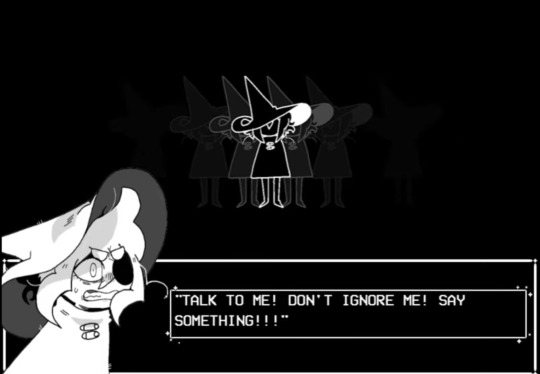
But he gets no response, as you get no attacks to strategize around. The wait for anything to happen is utterly agonizing. You and Siffrin are both waiting for something to happen. This isn't a fight. It just pretends to be. It's an utter rugpull, because Siffrin was so undefeatable for most of Act 4 and all of Act 5 so far. It's kind of terrifying!
and it does. It finally does something. Ma Du Pays speaks, in the voice of Siffrin's friends, listing out their deepest fears. I think it's honestly fantastic. You're forced to just sit here and listen to Siffrin's deepest doubts, things you know the characters could not say because it references the timeloops they're all utterly unaware of. This is all Siffrin, talking to himself. And all you, all Siffrin, can do, is keep wailing away on the enemy to no effect whatsoever.
So of course this ends with Siffrin giving up. What else can you do?
And then Siffrin's friends show up and unfreeze them and it's all very cool yay. The pure narrative scenes aren't really the main focus but I want to point out here:

A) Mirabelle is in the first party slot here, referencing how she's the de facto protagonist, and Bonnie fills in the fourth slot left empty, which shows all characters uniting to save Siffrin
B) this is the only instance of the other party members having act specific battle icons: they're all smiling brightly, further pushed by the upbeat music
C) the reflecting shield Mirabelle uses to freeze the King uses a variation of her hangout skill cut in, marking it as her true "final" skill and giving the whole fight a more climatic feeling.
It's also a short gameplay sequence with Siffrin utterly uninvolved in the battle. You can't even see them onscreen. But... it feels warm, doesn't it? Everybody coming together. Siffrin doesn't have to fight anymore.
At last, the King is defeated. Siffrin and co. make for the Head Housemaiden, to have her look at Siffrin's sudden illness. Siffrin is utterly exhausted, famished, running a fever. And this isn't unexpected - after all, their skills in Act 5 had no cooldown. For context, instead of featuring any sort of MP system, all skills work on a cooldown basis, where a character can't use it for a certain number of turns. The lowest cooldown is actually Siffrin's Knife to Meet You, which has a cooldown of 1. In universe, this is reasoned as the characters needing a break from spamming craft in order to not exhaust themselves.
Siffrin's skills in Act 5 having no cooldown/being infinitely spammable isn't a sign of their strength - it's a sign that he refuses to let himself rest in order to rush through as fast as possible.
Moving on, Siffrin panics when seeing the Head Housemaiden, because seeing her means one thing: the end. Prior to this in the game, every single time you beat the King, the loop ends when you talk to the Head Housemaiden.
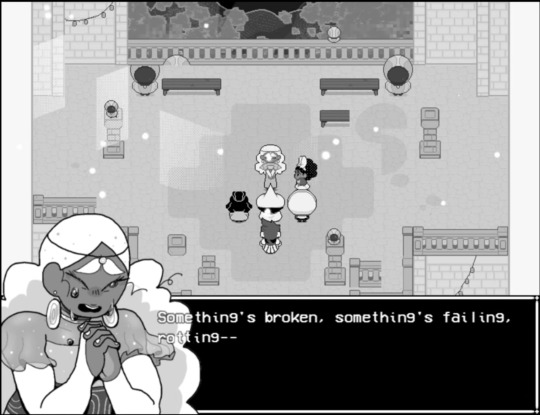
Reality breaks down, the whole shebang. It's here that Siffrin realizes - they don't want the loops to end, because the end of their journey means their family will leave, and he'll be alone again. The happiest time of his life will be over.
Siffrin goes totally ballistic, to say the least.
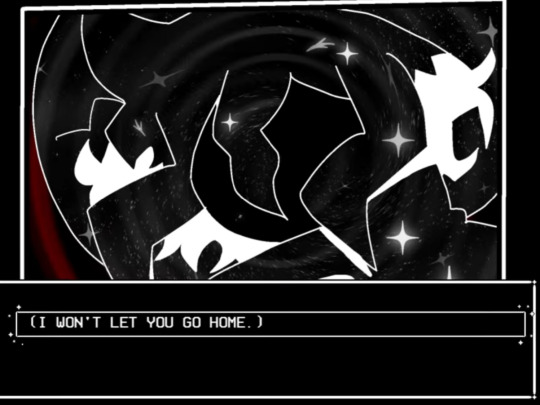
As it turns out (and was heavily foreshadowed narratively), Siffrin has been using Wish Craft to subconciously cause the timeloop because of their abandonment issues. It's rather predictable if you paid attention to literally anything, but it's extremely notable how heavily Siffrin is paralleled to the King, the antagonist they swore to kill by themself at the start of Act 5. The King wants to freeze Vaugarde in time because it is, in his mind, "perfect," for accepting him after he lost his home - a backstory he shares with Siffrin.
Siffrin has become the exact antagonist he swore to kill, and it's shown by how the next fight utterly flips everything on its head.
Siffrin is the final boss.

In a towering form made of stars, Siffrin looks down at their friends. His face is terrified, because of his internal conflict; he can't hurt his friends, but he can't let them go, either. The combat prompt is simply changed to "END IT!"
This fight is similar to the previous, in that you just need to wait a certain number of turns until its over. However, this time, it's not dreadful suspense. It's... confusion, and hesitance.
You have two options for combat: Attack your friends, or attack yourself.
And... you don't really want to do either, I think. I certainly don't. But what else can you do? It's Siffrin's desires clashing in full force. Attack your friends, and force them to stay? Or attack yourself, and let them go safely without you?
Worth noting, here - when you attack Siffrin's friends, you can't harm them. Isabeau will shield all attacks. And when you attack yourself, Mirabelle will heal you back to full. And the friends don't... do anything, either. How could they? Occasionally, Mirabelle heals you and Isabeau shouts words of motivation, but the main thing is...
(Your friends don't know what to do.)
None of them want to harm Siffrin. Both sides simply stare at each other, resolute in their conviction but unwilling to end it with violence. It's of note that this loop, the last one, is the only loop where the King isn't killed. Just frozen. And now here is Siffrin, clamoring for the same eternity the King was. Of course everything ends in a tearfilled conversation as Siffrin sees their friends won't leave him, even after the journey ends, but I still have to appreciate this moment.
Siffrin is directly put in the position with their friends as his enemies, forced to physically reckon that keeping them in this loop is an act of violence, against both their friends, and against himself.
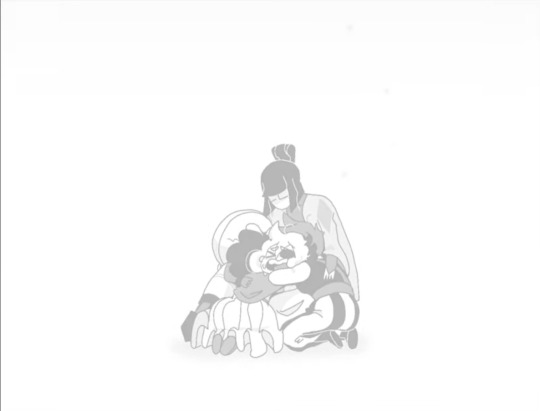
It's a happy ending. But... what does it mean?
Of course, ISAT is obviously about the fear of change. Siffrin is afraid of the journey ending, and of being alone. However, ISAT is also a game about games. Siffrin is playing the same game, over and over, because it's comforting. It's familiar. It's nice, to know exactly what happens next. These characters might just be predictable lines of dialogue, but... they feel like friends. Have you ever played a game, loved it, put countless hours into it, but you never finished it? Because you just couldn't bear to see it end? For the characters to leave your life, for there to be a void in your heart where the game used to be?
After all, maybe it became part of your routine! You play the game every day, slowly chipping away at it for weeks at a time. For me, I beat ISAT in four days. It utterly consumed me during this time. I had 36 hours of playtime by the end. Yeah, in that week, I did not do much more than play ISAT.
And once i beat it, i beat it, again. I restarted the game to see the few scenes I missed, most specifically the secret boss I won't talk about here. I... couldn't let go of the game yet. I wanted to see every scrap I could. I still do. I'm writing this, in part because I still do. It's scary to let go.
Ever heard the joke term of "Postgame Depression?" It's when you just beat a game, and you're suddenly sad. Maybe because the ending affected you emotionally and you need to process the feelings it invoked, or you search for something that can now fill your time with it gone.
The game ends, for real this time, the last time you talk to the Head Housemaiden. But Siffrin gets... scared. What if everything loops back again? And so, his family offers to hold his hand. They face the end, together.
For all loops, including the ending, you never see what happens after. After they leave the loop for good. Because the loop is the game itself. It's asking you to trust that life goes on for these characters, and it holds your hand as it asks you to let go. There's a reason for Siffrin's theater metaphors. He is the actor, and the director, asking everyone to do it over one more time. He's a character within the game, and its player.
There's a reason I talked about endgame content. This, the way it all repeats, there's nothing new, difficulty and stakes bleed away as you snap the game over your knee - it's my copy of White 2 with two hundred hours in it. It's me playing Fire Emblem Awakening in under 3 hours while skipping every cutscene. Are you playing for the sake of play, for the sake of indulging in your memories, because you're afraid of the hole it'll leave when you stop?
Of note: the narrative never condemns Siffrin for unwittingly causing their own suffering. He's a victim of circumstance. It's seen as endearing, even, that Siffrin loves their friends to the point of rather seeing the world destroyed than them gone. But Siffrin is also told: we'll stay with you for now, but we'll part ways eventually. And one day, you'll have to be okay with it.
Stop draining the things you love of every ounce of enjoyment just because you're afraid of what happens next. I'm not saying to never play your favorite games again. Playing ISAT a second time, I still had a lot of fun! I saw so many new things I didn't before, and I enjoyed myself immensely, reading the same dialogue over and over. But... it makes me look at other games I love and still play, and makes me ask... is this still fun? Do I still need to play this game to enjoy it? Even writing this is an afterimage of my enjoyment, but it's a new way to interact with the game, to analyze it through this lens. Fuck, man, I write fanfiction. Look at me.
All of this, fanart, fanfic, analysis, is a way to prolong that enjoyment without making yourself suffer for it. Without just going through the motions of enjoyment without actually experiencing any. But one day, the thing you love won't be fun to talk and write and draw about. And it's okay. You'll have new things to love. I promise.
In the end.... I'm certain I'll replay ISAT one day. Between great writing, art, puzzles and unresolved mysteries, it's my shoe-in for game of the year.
But I won't replay it for quite some time. I've had enough, for now, so I let my love take other forms.
Siffrin is never condemned, because love is no evil. Be it love for another person, or for a game. And please, if you're overempathetic - it's still a game, at the end of the day. The great thing about games is that you can always boot them up again, no matter how long its been.
A circle within a circle indeed.
To summarize:
The repetitiveness of ISAT's combat, lack of new enemies, and Siffrin's ever increasing strength eventually allows you to snap the combat over your knee, rendering it irrelevant and boring. Though this may seem counterproductive at first, it perfectly mirrors how Siffrin has also grown bored with these repeated encounters and views them only as an obstacle to get past. The reflection of Siffrin's own tiredness with the player's annoyance increases the compassion the player has for Siffrin as a character.
Additionally, the endgame state of the combat system serves as commentary on the state of a favorite game played too often, much like how Siffrin has unwittingly trapped themself in the loop. Despite the game having no more challenge or content left to over, a player might return to their favorite game anyway, solely to try and recreate the early experience of actually having fun with it. This ties into ISAT's metanarrative about the fear of change and refusal to let go of comfort even when the object (here, your favorite video game) offering that comfort has become utterly bereft of any substance to actually engage with. Playing for the sake of playing, with no actual investment to keep going besides your own memories.
Later on, stripping away even the pretense of strategy for a "press button and wait" format of final bosses highlights the lack of options at Siffrin's disposal and truly forces the player into their shoes. Truly, the only way to win is to stop playing.
#feli speaks#in stars and time#isat#isat spoilers#lays down on floor. it's done. it's done#i actually narrowed down in scope to just focus on the combat by the way. and this is like. several thousand words
2K notes
·
View notes
Note
Sigh....Galemancers really love to move the goal post when it comes to the grooming accusations huh? You found out Gale was a fully grown MAN when Mystra slept with him so now you have to say, "Well then he was emotionally groomed and the power dynamic is too vast." Mystra is a neutral good goddess because she's Midnight, who was a neutral good human. She hates that her magic has to be used for good and evil. Ao makes her share it evenly but she'd rather not. She would never do anything to hurt Gale. The writers of the game even confirmed she's not a groomer. People like you also downplay the point of Gale's entire story arc, which is he should've listened to Mystra! The whole point of his personal quest is he needs to learn to humble himself and listen to his goddess! He has no one to blame for his downfall but himself.

There's no "post" to move, anon. The game and lore give us all the context we need. Grooming doesn't only apply to children, and people have proven right and left that Mystra is terrible at relationships. She's petty and abusive when she isn't obeyed by her partners, and that's been the case with all of her iterations. Even the narrator describes her as a "jealous goddess" when you visit her shrine. Plus, your information is wrong on many accounts; the most pertinent being that the Mystra of BG3/5E isn't technically Midnight. Cyric and Shar killed her, reducing her to her godly essence (lore-wise that means she died). The current Mystra is an amalgamation of the vestiges of Mystryl, Mystra, and Midnight, as told in the novel Elminster Enraged.
Now, this is about to get complicated, as it always does with Mystra, so from here on out I'll be referring to Mystra #1 as Mystryl, Mystra #2 as Mystra #2, Mystra #3 as Midnight, and Mystra #4 as 5E Mystra. Alright, let's get started.

Elminster had to reform the fallen goddess by giving her fragments of all three iterations of Mystra. Since all three iterations are combined, our current 5E Mystra embodies the good, the bad, the beautiful, and the ugly. There's even a conversation with The Simbul (one of the Seven Sisters and a Chosen of Mystra) where the newly reformed 5E Mystra speaks of Elminster as her "longest lover". This puzzles The Simbul because that was something of the old Mystra (Mystra #2), not Midnight. The new 5E Mystra replies that she has become a combination of the memories of Mystryl, Mystra #2, and Midnight. This is all in chapter 25-30 of Elminster Enraged. I know it's confusing, but in short: 5E Mystra is not Midnight anymore, and the leading mind is clearly that of Mystra #2, hence her extremely poor judgement—a recurring theme with her character.

Mystryl and Mystra #2 were originally lawful neutral. The alignment changed to neutral good when Midnight took up the mantle, because Midnight herself was a neutral good person. But now it seems 5E Mystra is true neutral, because you are right, anon; Ao won't allow her to do whatever she wants. Midnight tried and was forbidden. 5E Mystra absolutely does not have the same level of humanity or kindness as Midnight, and that may be because Mystryl had no human consciousness and Mystra #2 was a mess.

Regardless of her alignment, she must embody her domain by Ao's decree, which means she needs to spread magic across all Realmspace. Since she has to maintain the balance, she approaches good, neutral, and evil mages with potential opportunities. This isn't a criticism (that's just how godhood works), but rather proof that Mystra is absolutely capable of good and bad. I don't want to hear any more of this "she's a precious little bean and Gale's victim" nonsense. Even if she wants to be, she's not. As Kikitakite said in their post, she's done some fucked up things.

Whether or not the writers intended to make Mystra a groomer, that's exactly what they did. Sometimes writers don't realise they've written an abusive character until they're criticised. Take writer of The Notebook, Nicholas Sparks, for example. He didn't realise he'd written Noah to be an abusive piece of shit until Ryan Gosling pointed it out himself. Gosling has gone on record many times to say he hates Noah, and experts have labeled him an unrealistic and emotionally abusive/manipulative character. The same can be said for Stephenie Meyer, who wrote some of the most celebrated toxic relationships in recent media—with a dash of borderline pedophilia on the side. Therapists have weighed in extensively to tell people that Bella and Edward's relationship isn't healthy and shouldn't be emulated in real life. Indeed, perhaps the best thing to come out of the entire franchise is Robert Pattinson's hatred of Edward and the series as a whole. Jacob's actor, Taylor Lautner, even argued with Meyer's on set because of how weird the "imprinting" segment was and he didn't want to come off as predatory. Meyer argued it was "romantic". 😕

Even if you don't agree Gale was groomed, Mystra is flagrantly responsible for his insecurities and she never should've put her hands on him. The power dynamic is too vast, and even god Gale (conceited as he is) realises it by the end. He only stays in a relationship with Tav if they allow him to ascend them alongside him as his equal. He recognises that anything else would be unhealthy and unacceptable. Also, I researched high and low regarding your claim, but none of the devs have dispelled the idea that Mystra is a groomer. In fact, the most I could find was one dev simply saying, "To Gale it was love, but he didn't know any better." If anything, that only confirms he was confused and didn't know what to do. Their "relationship" was a stunningly horrible idea from the start and that's not on Gale, it's on the literal cosmic being who initiated it.

Moreover, Gale was very likely 17 when Mystra revealed herself to him. This perfectly fits into the 5E Forgotten Realms timeline. If so, no, he absolutely wasn't a grown man. He was a teenager. Mystra may not have slept with him until he was in his 20's, but that still makes it a disgusting teacher-turned-lover situation. Gale even tells us he was "young" when she took him into her fold, and he was only eight years old when Elminster started their lessons. Remember, Elminster is Mystra's biggest apologist. He would've taught Gale to revere her, which means there was almost never a point in his life when Mystra wasn't the main focus. You can tell by the way he speaks about her in Act 1. He's in awe, he's excited, he's proud she chose him. That does something to a child. Something irreversible. If anything, Elminster is complicit in what happened. I've said this before, but he couldn't even be bothered to visit Gale himself. He sent a simulacrum.

As for your accusation that I'm "downplaying" Gale's story arc—you're damn right I am, because the writers made me! Most D&D players I know aren't very happy with how Mystra is portrayed in the game, and that's probably because even they know she isn't presented in a very flattering light. If you really think about it, it's obvious what the writers were going for, but they failed. For example, you said Gale should've listened to Mystra, right? Well, in Act 1 he admits his ambition was his undoing, blames himself for his downfall, and by Act 2 he's literally ready to off himself for her. In fact, he's the only one who sees her ultimatum as justified. Every other companion says she's being cruel and unreasonable. If Gale actually blows himself up at the end of Act 2, the results are catastrophic. The brain is destroyed, yes, but the tadpoles, free of the Absolute's control, complete their transformation and infect/enslave the entire Sword Coast. Anon. She. Is. Stupid. Even the Narrator is like, "You wanna ... you wanna try that again?"





The entirety of Act 2 is Gale learning he shouldn't listen to Mystra. And then she has the audacity to lecture him in Act 3? If he'd listened, it would've been the end of everything. Maybe if Mystra was as infallible as she pretends to be, she would've put her three brains together and came up with a better, less vindictive plan. Because make no mistake, she wanted Gale to blow up in Act 2, which is ridiculous. I know this is an uncomfortable topic for some people, but gods aren't perfect, especially in fiction. They're flawed. They're selfish. Some of them are straight up assholes. The real irony of Gale's arc isn't that he has no one to blame but himself, it's that Mystra should blame herself. At no point does she even consider if she's being unreasonable or unfair. There's no self reflection whatsoever. And the writers expect me to think Gale's full of himself? I wonder where he got it.
Probably from his teacher. ✋🎤
#baldur's gate 3#bg3#gale of waterdeep#gale dekarios#bg3 mystra#mystra#dnd#d&d#dungeons and dragons#elminster#bg3 tav#lore#twilight
550 notes
·
View notes
Text
Can we talk about Magnus in Harrow the Ninth? Because there's a tendency to paint him as this constantly cheerful figure and he's not - he's just very Fifth.
He's the only person who seems even slightly upset about the whole gun-toting horror thing:
“Did the Sleeper get them?”
“Only by assumption,” said Harrowhark, while Abigail’s dolt of a husband said, “I bloody hope so.”
“Magnus,” Abigail said, a touch disapprovingly.
“Well, if the Sleeper didn’t, that’s two maniacs with an ancient weapon and a love of blowing off faces, dear,” said Magnus.
And he's got a very low opinion of Silas:
"She won’t tell me what he said to her, just that he ‘was horrid.’”
“Cheeky little so-and-so,” said Magnus. “If he were my son, I’d give him something to think about. I’m not surprised he’s gone to ground.”
“I would hope your son might be of different character,” said his wife, half-smiling.
“Protesilaus should have biffed him.”
“It’s strange,” said Abigail, ignoring her husband’s exhortations to biffing.
Behind the jolly Jeeves and Wooster-esque talk of biffing people, let's remember that this is Magnus - who from Gideon's POV never saw a teenager he didn't want to adopt - earnestly wishing that a grown man had hit a 16 year old kid.
And when Harrow explains that she thinks she saw him jump to his death, Magnus isn't particularly sympathetic:
“We should have made him a greater priority,” said Lady Pent.
Magnus said, “I’m not certain.”
and
“We didn’t need him,” he said bracingly.
Abigail said, “We need everyone.”
“I never thought he was quite the thing.”
This "never quite the thing" line is the same one Abigail uses when she says Ianthe shouldn't have become a Lyctor and you get the sense it has a quite specific meaning on the Fifth. You get the distinct feeling Magnus is saying "good riddance" in response to a teenager's apparent suicide.
And then of course there's Magnus' conversation with Harrow as the River bubble collapses, as Harrow debates whether she should leave her body to Gideon:
She said: “If I go back, it will finally destroy her soul.”
It was Magnus who stepped forward and looked at Harrow face-to-face. And perhaps she felt that more keenly: that he was the man who had, in Gideon’s own words a lifetime ago, been nice to her cavalier. His mouth was hard now, but his eyes were as kind as they had ever been. And kindness was a knife.
He doesn't pull any punches in laying out his understanding of the situation to Harrow:
“This whole thing happened because you wouldn’t face up to Gideon dying,” he said, which was a stab as precise as any Nonius had managed. “I don’t blame you. But where would you be, right now, if you’d said: She is dead? You’re keeping her things like a lover keeping old notes, but with her death, the stuff that made her Gideon was destroyed. That’s how Lyctorhood works, isn’t it? She died. She can’t come back, even if you keep her stuffed away in a drawer you can’t look at. You’re not waiting for her resurrection; you’ve made yourself her mausoleum.”
His wife looked at Harrow’s face and murmured, “Magnus, you’ve made your point,” but he uncharacteristically ignored her.
He's trying to get through to her in a very fraught situation, but he's certainly not pulling his punches:
“You’re a smart girl, Harrowhark. You might turn some of that brain to the toughest lesson: that of grief.”
Abigail is also trying to talk her out of things, but she's much more discursive and apologetic. Magnus is kind, but it's kindness as a knife, not a cushion.
Magnus is so often written off as just a silly, goofy character, when he's more complicated than that. He's allowed to have a very real frustration with the River bubble and with Harrow, however much he does also care for her and want to help her.
And you know what, he's a CFO stuck in a horrorscape with his delighted ghost nerd wife and a bunch of soldiers. He runs with it - he cracks one of his House ordinal jokes while physically tackling a gun-toting ghost and makes a decent go at it before getting shot. But he's very much out of his comfort zone, angry, and no longer entirely held back by propriety.
#the locked tomb#tlt#magnus quinn#harrow the ninth#To digress into TUG spoiler territory...#A Lyctoral Abigail slowly blurring her calm and polite filter into Magnus' directness...
1K notes
·
View notes
Note
Jie jie, what is The Double about?
hahahahahaha i was waiting for someone to ask!! mr r has bailed on me at work again and bossman has the man flu so it's just. me at the office today. working my ass off for partners who are trying to Kill Me™.
what: period cdrama // completed // 40 eps, roughly 45 mins each where: youku (standard disclaimer that i don’t watch with subs so i don’t speak to the quality of eng subs) // i think viki is picking this up?

this is xue fangfei. daughter of a small town magistrate. married a poor scholar for love against the wishes of her dad. this turns out to be a bad, bad, bad decision because he ends up burying her alive in the mountains sometime post-marriage. :)
this all happens in like ep 1, we're just getting started.
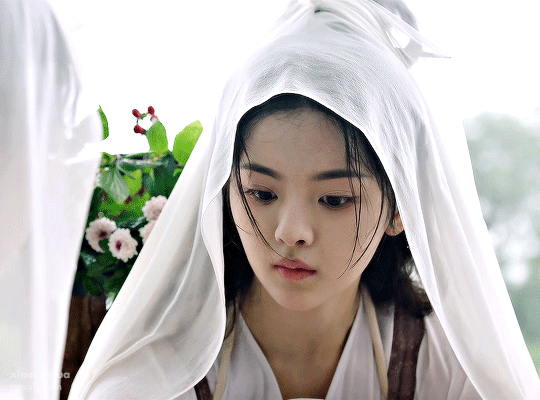
xff ends up being rescued by jiang li, who is the prime minister's kinda-sorta-exiled daughter. jl has been stuck in a kinda-sorta-nunnery in the mountains for the past 10 years because of her evil stepmother.
i'll skip past all the other bits because there is a bit of a backstory about what happened to jl, but long story short!! jl dies (kinda-sorta-because of xff). xff decides to get justice for both herself and jl. her plan is:
1. become jiang li 2. go back to the capital 3. ?????? 4. profit make everyone pay
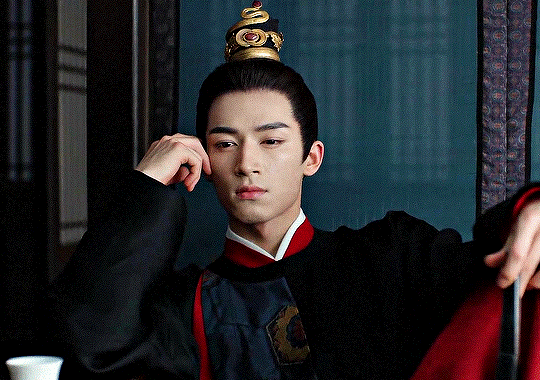
this is xiao heng a.k.a. su-guogong (the translation is duke su but it sounds weird to me so i'm going to stick with su-guogong). he chances upon xff while he's trying to catch a criminal.
xff, who is in the process of executing her Escape Plan, decides eh, any way to escape will do and lets s-gg arrest her to take her back to the capital for interrogation.
(yes, this is wang xingyue who played zhang zhe in kunning palace. yes he looks a++++++ in this show. i am obsessed.)

side bar, counsels, for a bit of very important information -
su-guogong recognises xue fangfei!! he knows 100% that she is not jiang li and that she is going to cause some chaos. he is Committed™ to watching this drama play out.
ANYWAY. this is the loose premise of the show. it's been fun to watch, and i'm enjoying this a lot!! why should you watch the show?
wang xingyue looks so good in this!! the fans? the capes?? i am obsessed!! everyone in the costumes department deserves a raise.
the story moves quickly and doesn't really drag on. so far, it's been nothing complicated and interesting to watch - i wouldn't say this is a plot-heavy show, just a v good 宅斗 for now, but i'm only like 10 eps in.
the torture my ex-husband who murdered me by showing up in front of him and saying all the right things to remind him of me and the fact that he killed me is so good - normally when this happens, the person looks nothing like their former self, but!! xff's looks haven't changed!! so she's just out here going - hi i am jiang li now and oh btw do you know how cold it is in the mountains where you killed me :)
look i'm......intrigued by this whole shen yurong (ex-husband) and the zhang-gongzhu storyline. i want to see how this whole thing plays out!!
eta: quick post-watch thoughts (may contain spoilers)
a v enjoyable drama!! this is a 爽剧 for reals, like all the plot points get wrapped up and we get a few cute snippets into their happily ever after!! i'm a bit :/ about the way the last few scenes were done in ep 40 (the side character deaths??? extremely unnecessary 🙄🤬 actually the whole war scene was unnecessary but i'm not complaining too much because it gave us That Scene), tbh the whole thing looked more OE leaning BE than HE to me, so the 番外 was quite important to me!! glad we got that!!
shen yurong and zhang-gongzhu both turned out to be so much more interesting than i thought!! a+++ villains, v well-written, and both actors played them beautifully 👏🏼
still an 8.5/10 rec tbh, started strong and held my interest the entire way through
423 notes
·
View notes
Text
#1 thing I am the most curious about/eager for the series to explore is 1000% the Morningstar family, especially Lilith
Bc who even is Lilith in reality besides what we have seen her as in the eyes of the other characters
Clearest image we get of her is in their family portraits
We usually see her as the menacing mystery figure working in the background, but in these photos she's clearly a normal happy mom who genuinely loves her family as any mother/wife would. She's not just a smirking dominant figure with a hidden agenda. All she's doing is having fun with her family and has no qualms about showing a range of emotion.
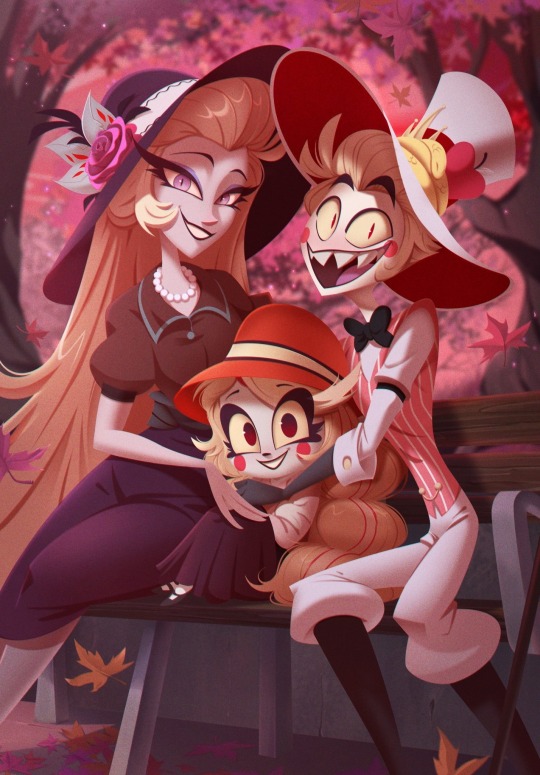
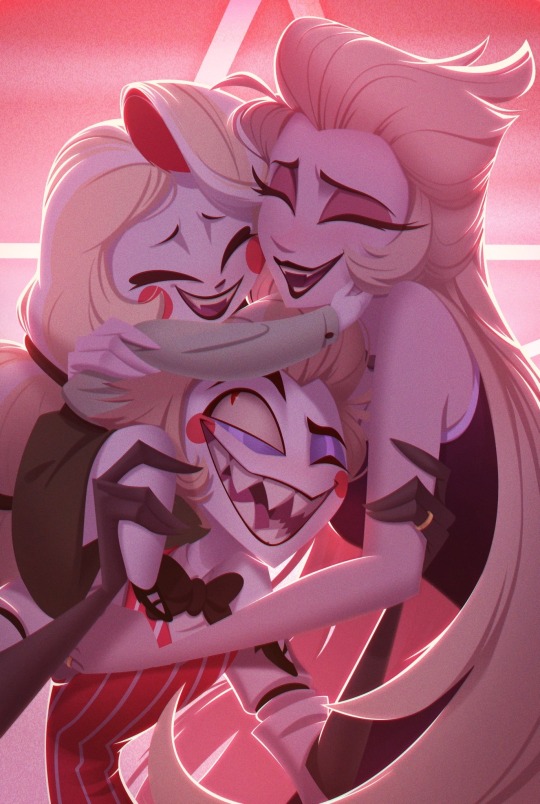
Charlie sees her as the role model she takes after and wants to make her proud. It turns out she sees Lucifer in pretty much the same light, but with the addition of having an awkward relationship bc of the distance they've had. With Lilith she never speaks about her with any lingering awkwardness, so we can assume she's been a good mom raising Charlie this whole time.
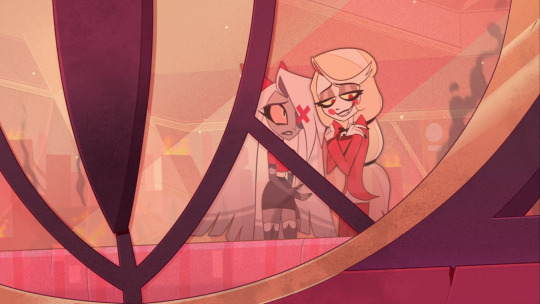
(For those who are saying "Lilith is a bad mom bc who leaves their kid alone for 7 years???"- she is literally thousands of years old while Charlie is well into adulthood before those 7 years. It's like a business trip to them. She wasn't an absentee parent for leaving for 7 years out of Charlie's 200+. The thing that's weird is that she's not communicating with Charlie. Our girl deadass owns property with a job and employees. Just bc she's not great at it and is having Lucifer step in to help recently, doesn't make Lucifer the superior parent suddenly. He's confirmed to be a kind of shitty dad despite how much he cares for her by the creators themselves. Kind of the point of his introduction ep guys. The 7 years are a mystery to unpack. Chill tf out.)
In this flashback people are blaming Lilith for separating Lucifer and Charlie on purpose, seemingly as the cause of their distant relationship. But it feels more complicated than that, based off Lucifer's reaction.
He's sad reaching out to Charlie by the end of the flashback, but when Lilith first appears he's smiling all the same and not deterred in giving Charlie to Lilith to carry away for what reason we don't know. A normal, standard occurrence he's used to. It seems both parents have agreed it's best for Lilith to take Charlie at this age now, for whatever reason.
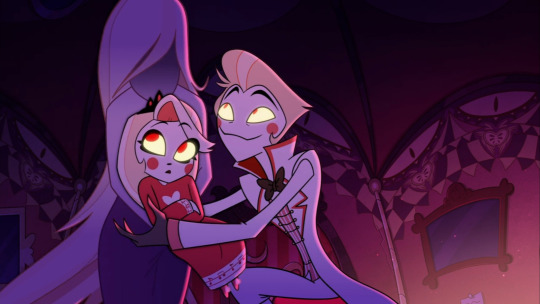
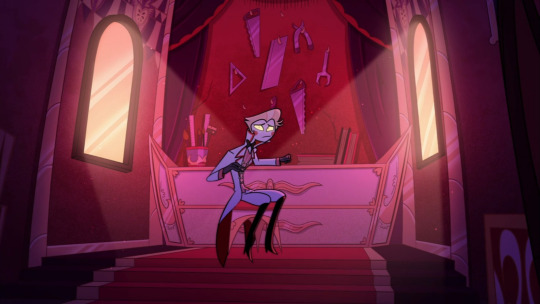
Was his mental health affecting his parenting too much so they decided Lilith would shoulder the bulk of the task? Maybe Lilith really did separate the two somehow for her own reasons and convinced Lucifer with it? Another mystery reason each parent agree on?
When exactly did both of them separate? When Charlie was already an adult or around the time of the flashback when Lilith was her primary caretaker as a kid? (I'm assuming adulthood since Lucifer and Lilith seemed to still be getting along in the flashback despite her emotionless face.) Why did they separate when Lucifer seems to clearly love and yearn for her all the same, still wearing his wedding ring? 😭😭😭
And ofc what is this deal she made with Adam to stay chillin on a beach in heaven, and why did Adam, a reckless narcissist who likes yappin to whoever is gonna listen, not ever reveal this fact to her family to the very end?
There is just so much to unpack with their family and Lilith is the key ingredient rn to unlocking it
Like ofc I'm looking forward to Sir Pentious in heaven, Alastor's deal, the future of the rebuilt hotel, Lucifer now being a seemingly main character in season 2, etc.
But the Morningstars,,,different level
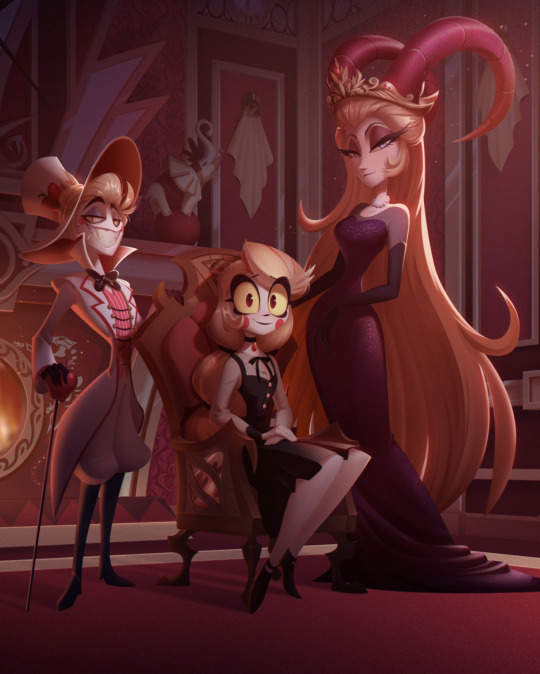
719 notes
·
View notes
Text
Caped Crusader, "Safe Diversity", and Catwoman

We're at a point where it's expected that a new incarnation of any story previously with a white-dominated cast would be reimagined with a "more diverse" cast. This can mean racebending them, genderbending them or making them queer, but for the purposes of this analysis we'll be focusing on racebends. Most of the time, executives will take the "safer" routes with diversifying their cast- pick a couple of unproblematic supporting characters to be incidentally "diverse this time". Other times, there might be "braver" takes where more prominent characters (perhaps even the main character) are racebent. This doesn't necessarily mean racebending prominent characters is an inherently better thing to do.
I've been more than critical of MAWS' portrayal of BIPOC characters but especially their Asian Lois before. Sometimes BIPOC representation is just a decorative palette-swap change for these shows. Caped Crusader however, is different. It's more complicated- but it's rooted in very similar problems. Unlike MAWS (though I can only speak for S1), CC is far more willing to take on political topics: classism, sexism, police corruption and brutality, even beauty standards in the entertainment industry! Yet, in choosing to portray these topics in their stylistically anachronistic 30s-40s set piece- it makes it so the show's reluctance to discuss race intersecting with any of these topics far more apparent.
(spoilers for all of Caped Crusader)
Take for instance, episode 2: "...And Be A Villain". The story is about Basil Karlo, a less than handsome actor who wishes his appearance wasn't holding him back from both love and playing roles saved for better looking people. He makes a deal with Jack Ellman, an experimental makeup artist who turns him into Clayface. This story is set in motion when Miss Yvonne Francis, a beautiful actress, goes missing. Miss Francis is a woman of color (brown skinned, unspecified) played by Lacey Chabert: a white actress. CC goes for a generally colorblind casting what with Stephie (a white girl) being voiced by Amari McCoy (a Black actress) but it always feels icky when a white actor voices a character of color. Prominent characters of color in CC are more accurately casted. However I do think animation should be wary of using their medium to get away with their show appearing more diverse than the actual talent behind it.

The episode's theme is pretty clear on how unfair the entertainment industry is in regards to who it prioritizes in leading roles. Basil is constantly emphasized as a tragically talented actor whose appearance is holding him back. "With your talent you should be a leading man, Basil." Yvonne says to Basil in a flashback. Meanwhile as Alfred is watching through movie clips featuring Yvonne and Basil together, he comments "while lovely to look at, Miss Francis is no Gloria Swanson." So Yvonne has the looks, but not the talent and still gets prestigious roles because that's showbiz. The only time this is weirdly inconsistent is when Yvonne calls out Basil/Clayface in the finale, saying:
"I don't believe your performance. You're chewing on scenery. Relying on makeup effects to enhance weak characterization. It's insincere, Basil. It's not real."
I honestly feel like this scene was just meant to quickly "subvert" Yvonne being a damsel in distress by having her call out Basil's acting. It's a moment that isn't reinforced by anything the episode set up. After all, according to Alfred, she's not as good an actor compared to Basil. That's supposed to be how they foil each other, so this moment feels unmotivated. Again, I get what they're going for, that Basil's performance ironically relies on his newfound appearance so much that even a bad actress like Yvonne can spot his meager acting. But it doesn't work when our protagonists were actually convinced by his imitation of others. She's still a damsel in distress character regardless of her having a bit of attitude when calling her captor out.

What I don't understand is: why make Yvonne a woman of color if this was the story you wanted to tell? It's not like they're paying homage to how her voice actress looks, after all. Why, in your story set in purposely anachronistic 30s-40s era noir, did the character who was meant to represent the epitome of "not talented but gets by the industry because of her conventional beauty and pretty privilege" a woman of color? We're missing the very obvious conversation here where Tinsel Town is a white industry with white biases to what it considers attractive. It doesn't matter how many attractive actors of color exist, they're still pigeon holed into stereotyped and often racist roles (especially back then), and have to work twice as hard to get the opportunities their white colleagues get. Why is Basil, a white man, the only one afforded a marginalized narrative when Yvonne is quite literally a woman of color right next to him? The episode is especially painful to sit through when Basil is afforded so much sympathy compared to Yvonne.
"He didn't have the right look. He didn't have the right face."
"The camera is kind to some, but cruel to others."
This is transparently a colorblind narrative. Yvonne is written and even casted as a white woman. The CC crew just decided she should be a WOC likely because "wouldn't it be neat if the beautiful actress in this story is POC" without thinking about how that would drastically change a narrative already critical of the showbiz industry based on appearances. It's not intersectional and flattens the narrative to being selective of the prejudices Tinsel Town has. This episode is a great example to what CC generally does with diversity. It's not afraid to be critical of society, but it gets oddly squeamish with discussing how race intersects with these topics- opting mostly for a palette-change type of representation.
It's not entirely fair to say CC doesn't ever touch on the topic of racism. It sort of does: if you read between the lines for why the mayor gives Jim Gordon his commissioner role, and more prominently with the Gentleman Ghost (a rich aristocrat ghost that steals from the poor, believing wealth is his right) being offended that his mansion is sold to Lucius Fox (saying "and you would sell it to rabble like this?")- racism is somewhat present in the world of CC. We see the women in this show experience misogyny, but it's ambiguous if any of their struggles are intersectional with that of race. But that's... just about it. Racism isn't discussed more than it is alluded to, whenever the writers decide it's relevant. Because of this, CC has a spectrum of hits and misses when it comes to integrating characters of color in their reimagined cast.

Here's how I would visualize that spectrum using canonized instances of Asian Lois Lane. I should emphasize that representation of people of color doesn't entail the narrative owing us "a racism arc" or what have you. This spectrum is more used to measure how much racial identity was integrated in the characterization of the character: whether that be cultural identity or history. Being a person of color isn't just "person who goes through racism".

This is how I'd personally place the prominent characters of color in CC on my "spectrum of racebends" chart. Generally most of the characters of color (whether reimagined that way or were originally POC already) are fairly harmless in how they were integrated into CC's world, but none of the characters feel bespoke as a reimagining of the character and are interchangeable with their white counterparts. To quote cartoonist Juni Ba (in a discussion on CC):
"...stripping characters of color in these time period stories of any cultural, [a]esthetic or social signifiers that’d make them true to the groups being represented. Instead they dress, act and speak very western."
In my opinion, the only character that is an exception to this is Linton Midnite (or as he's popularly known as: "Papa Midnite"). Midnite is a character so interlinked with Haitian culture and mysticism that even CC couldn't erase that aspect of his identity (important note: historically, the portrayal of Midnite since his creation is riddled in racism, but that's not my place to discuss here). Midnite at most speaks with an accent, dresses more nonconformingly compared to the western standard dress of all the other characters, and practices occultish stuff (though I don't think there was anything culturally specific in that episode, please correct me otherwise if someone has more insight!). That's a lot more cultural representation than just about any other character of color in CC. Midnite can't be changed to a white character, his African identity is too interlinked with who he is.
There are a few characters I consider in poor taste to be POC- that being Arnold Flass, Yvonne Francis (who we've covered already), and Harley Quinn (who will be getting her own post, as her case is complicated). So let's talk about cops, then.

I tend to be indifferent about media choosing to diversify cop characters because it feels like choosing the most "respectable to society" role for a marginalized character to play. Cops uphold bigoted systems of power at the end of the day, so that's a very comfortable place to represent your marginalized characters. It's why we keep getting gay or lesbian cops, which Batman media absolutely perpetuates as well with Renee Montoya. It's hard to cheer for two women of color being allowed to date and kiss in public when one of them is a cop, y'know? But this doesn't mean re-imagining cop characters doesn't have narrative merit.
In regards to Jim Gordon being reimagined as a Black cop, I'm gonna refer to La'Ron Readus' video on "Fixing the Batman's Copaganda problem" where he goes into detail about the missed potential of Black!Jim Gordon from Reeves' The Batman (2022). Generally, I felt that opportunity was missed in CC as well. While I love that Barbara Gordon is in CC, nothing about her being a WOC is integrated into this version of her. It felt like if either character was white, the story wouldn't be that different. The bigger issue here is the choice to racebend Arnold Flass- a previously white, blonde, cunningly smart, and brutally corrupt cop.

CC follows some of this in their version of Arnold Flass- he's paired with Harvey Bullock (also a corrupt cop). While Bullock is the brawns of the duo, Flass is the smarts. He's cunning and even implied to be willing to frame Bullock if the worse comes to it. It isn't an inherently bad idea to racebend a corrupt white cop into a Black cop. If the writers want to tell a story about how the police force assimilates people of color into the system and forces them to be just as if not more brutal than their white counterparts, then by all means tell that story.

But that's not what CC gave us. By rarely acknowledging race, we don't get to have a conversation or themes surrounding that delicate intersection of identities. We just have "diverse Flass". Look at these panels from Year One for example, can you imagine how Flass' casual disrespect for Gordon by constantly calling him "Jimmy" could be re-contextualized with a race change? Unlike other characters who just feel like missed opportunities for not integrating race into their characterization, Flass is an elephant in the room. To not acknowledge his race in themes of police corruption and brutality is to white wash the narrative with diverse paint.
I personally think the stronger narrative decision would have been to racebend Bullock as Black instead of Flass. Flass could still be the conniving cop, but he encourages Black!Bullock to be the more "violent brute" who does the dirty work for him. It would put a newfound racial layer to how Flass considers Bullock disposable. Then we could have some kind of commentary on how the police force encourages a system of abuse that makes even fellow POC turn on each other. It'd also make it so a certain scene would be better in optics.

I have many criticisms for the scene where Batman holds a gun to Flass in the finale of CC. It's a narratively unmotivated (see my criticisms for CC's Two Face here for elaboration) and weak moment that relies on metatextual shock value to cover up how underdeveloped this take on Batman is. But it's also just very uncomfortable optics-wise. It's a common and valid criticism that Batman as a character can very easily fall into copaganda, with his status, goals, and collaboration with the police force. In many ways, Batman is often written to be committing his own kind of vigilante police brutality.
Caped Crusader wants to be a deconstruction of a Batman tied to power and hellbent on his mission to eliminate crime. But because CC occasionally omits race from its narrative, the scene where Batman holds a gun to a Black cop-a man stripped of his ability to fight back-just falls flat for me. There's no acknowledgement in this scene that Batman basically gets to be an anonymous cop, "warning shots" and all. Batman shoots at an unarmed Black man several times. It's meant to be shocking to us how Bruce is willing to stoop to such a level and indulge in gratuitous gun violence, but it honestly hits too close to real incidents where this is racially the case for me to enjoy the narrative point of this scene.

You know a character who would be perfect for calling out Batman's many privileges? Selina Kyle. Let's talk about Caped Crusader's biggest downgrade.
I've heard just about all the arguments in favor for CC's reimagining of Catwoman and none have convinced me that this was in any way a good take on the character. I see people saying that this Catwoman is a return to her golden age roots, and there's a lot of misconception surrounding that assumption. So bear with me as looking at Catwoman's history is necessary to discuss race and how a character evolves.
Catwoman debuted in the 1940s as a jewel thief who disguised herself as an old lady. She was just called "The Cat" and would not don her more feline appearance until later. True to the mystery woman femme fatale trope she was inspired by, her backstory was left unknown for a long time. 10 years later, in Batman #62 it is revealed that after a plane accident bonked her head, the now named Selina Kyle got amnesia and went on a crime spree. Giving her leeway to reform and be an ally to Batman. This would historically inform how Selina Kyle toed the line between good and evil as an anti-hero.


Her origin would be revisited in 1983, in the Brave and the Bold #197. Although not canon to the mainline universe, it is still a crucial development for her character's history. In this story, Selina reveals that she lied about having amnesia to get out of facing punishment. Her true story was that she entered a life of crime to escape an abusive relationship with a rich man. The only loss her husband understood was material loss, loss of property, so stealing was how Selina fought back.
This crucial re-examination of her character transformed her from shenanigans inducing femme fatale, to a marginalized fighter. Shortly later in 1987 in Batman Year One, Catwoman is reimagined as a street-hardened sex worker in poverty. She is inspired by the Batman to become a vigilante for her own goals and gets annoyed that she's assumed to be his sidekick.

The moment Catwoman became marginalized by power, was the point where she became worthy of solo-character status. She was not only a compelling foil to Batman-capable of going toe to toe with him and make him question his motives even though she did not share his privilege-she could lead her own adventures reflecting a side of Gotham Bruce Wayne's perspective doesn't. She actively makes the setting of Gotham stronger because of how she's evolved as a character.
Catwoman's character would continue to evolve, with some iterations reimagining her as a latina woman and others where she's canonically bisexual.
While Catwoman has been portrayed by Black actresses before, I want to focus on the most recent and prominent iteration of a race-swapped Catwoman. When Matt Reeves' The Batman (2022) featured Zoe Kravitz as Selina Kyle, an explicitly biracial character within the text of the story, we see another step this character evolves. I think La'Ron Readus' video on "Why Race-Swapped Characters Are Not The Full Story" does a fantastic job of explaining why this is a narratively great race swap. To summarize (though I do encourage watching his video as he goes into depth about 2022 Batman's Jim Gordon as well among many other examples) and add analysis of my own: Selina being the byproduct of an Italian crime lord and a Black sex worker is a brilliant marriage of her original backstory (being connected to and abused by powerful men) and her modern backstory where she's poverty stricken (and tangentially related to a sex worker if we're talking about Batman Year One).

We understand why someone of her background would have an affinity for stray cats because of how she lost her mom at a young age, she is sympathetic to fellow people from the lower class, and explicitly calls out privileged white people- including Batman who attempted to over moralize Selina's partner as a sex worker.
"All anyone cares about in this place, are these white privileged assholes."
It's especially that last line that makes it so Selina's character isn't interchangeable with her white counterpart. She's a textually rich character to contrast Bruce in Batman 2022, and we can see how years of history and evolution has brought such an empathetic character to the screen. Interestingly, Readus feels that while 2022 Selina was an example of a race-swap that works, he believes it was great by coincidence, because of the miss that was Gordon's characterization in the same movie. I think with Reeves as a collaborator on Caped Crusader, that assumption was correct.

Selina in CC is back to being a rich socialite, but (unlike her Golden Age counterpart) she's not married into wealth- she's got generational wealth (with a dad serving jail time for tax evasion). Worse yet, she's taking what little remains of her money and spending it on superficially imitating the Batman to create her Catwoman persona. She even has her own reluctant Alfred, a Catmobile, the works. Selina steals things because. She likes shiny things. And is something of a kleptomaniac. Catwoman is instantly discovered to be Selina because of course she's not as good as Batman is with keeping a secret identity (another key difference from her Golden Age counterpart, whose backstory was shrouded in mystery for a decade).
It is laughable to me that CC touts that their version of Harley Quinn has an origin of her own outside of the Joker, only to turn around and make a Catwoman that is completely tied to copying a man as her origin (did they decide Harley's goofyness as a character needed to be replicated in Selina for some reason? In their supposed dark and edgy show?). What a strange choice to fixate on the part in Year One where Selina didn't like being mistaken for Batman's assistant despite being inspired by him and turn it into a quirky bit. It feels like such a regressive take that frames Selina as a sillier, whimsical version of Bruce that just spends money on a whim because women just aren't smart enough to know how to keep track of their money. They're too busy looking for shiny things to steal. The fact that both 2022 Batman and CC have a scene where Selina is looking through her many bills she's yet to pay is wild to me. How am I supposed to care for a Selina that has the expendable wealth to create a Catwoman costume, car, and gadgets, but delay paying her maid? One of these versions of Selina is far more sympathetic than the other.
Again, I get what CC is going for. Batman is characterized to be hellbent on catching criminals, Catwoman is supposed to serve as some kind of reflection of his obsession. They're both self destructive in their goals, but one is vengeance and the other is chasing thrills. But is that really as interesting a foil as having Catwoman be marginalized, just as skilled, and making Batman second guess himself? Is it a take that strengthens Gotham as a setting by shedding light on its lower class characters? Is it a take that makes her worth revisiting as a perpetual rogue and not a one off episode where's she's basically a shenanigans-inducing nuisance to Batman? Evolved takes on Catwoman have talked about her desire to seek thrills and paired it with how she dismantles power. So it's not like CC's take is particularly unique, it just lacks all the depth that usually surrounds Selina's thrill seeking.

In a show that is frankly desperate to make it so Bruce doesn't have a personal relationship to his rogues gallery because he's too busy being "A cold, remorseless avenger of evil, seemingly more machine than man. Forged in the fire of tragedy, every fiber of his being is dedicated to the eradication of crime." (according to promo) that's how we end up with Barbara as the foil and humanity to both Harvey Dent and Harley Quinn. How the show focuses on the police force more than Bruce. It feels especially pointed that Catwoman is characterized this way. When she doesn't contrast Bruce, she becomes less personal to him as a character that is poverty stricken but still matches up to him in skill. She can't challenge him or his worldview, he can't find her fascinating as an equal, all of their chemistry and intrigue is erased.

All this to say that of the characters revealed for CC, I was honestly surprised that Selina wasn't one of the many characters racebent. CC followed up on a Black Jim and Barbara Gordon, two characters that have been race swapped before in previous media. Most prominently! Harley is Asian in this iteration, something never done before. So why is it that Selina doesn't follow up on the many times she's been portrayed by Black actresses?
It's because it's an actual good racebend if written well. It wouldn't be a "safe" racebend because writing Selina this way means you'd have to acknowledge racism, and it would be much more noticeable if you didn't. There is no canonized version of Asian Lois Lane that parallels her relationship to Superman as an immigrant. But there is a version of Selina as a Black woman who directly calls out white people and is aware of systemic power. It's in something as prominent and mainstream as Matt Reeves' 2022 Batman. So instead it just reads as cowardice to me that CC couldn't follow up on this evolution of Selina.

Not only does it weaken Catwoman and Batman's relationship to regress Selina this way, but it actively weakens Gotham as a setting and the very themes of Caped Crusader. I personally think all the energy that went into Harley Quinn should have been shared with (or straight up gone to) Selina Kyle. Because unlike CC's take on Harley, the way Selina Kyle's marginalization intersects with race and queerness would have actually critiqued Gotham's class corruption effectively. As a Black queer woman, Selina would be among the most vulnerable people in Gotham. We don't have prominent characters in CC that truly reflect the lower class, there are these unnamed characters Harvey Dent sits next to on a train. There are some orphans with Batfam names. A proper Catwoman reimagining that takes advantage of her evolution would have filled this gap in their narrative.
But that's not how "safe diversity" works. CC would rather racebend and canonize the queerness of a character like their take on Harley Quinn. A WOC who gets to kiss a cop and call out powerful men, but not in a way that makes white people uncomfortable.
If I could edit the Sandman quote that "The great stories will always return to their original forms" for Superheroes, I'd say "The great stories will always return to their most resonant forms" because without iterations we don't get characters like the Kents, Alfred or Catwoman as we know her today. Classics are good to look to, but we like these characters because they evolve. In my opinion, none of CC's takes on these characters of color feel resonant. They're not definitive to the level of Mister Freeze's tragic love story in BTAS, among many standout narrative choices in BTAS that continue across media iterations.
In my opinion, CC isn't as thoroughly clumsy as MAWS is in regards to POC representation and race-swaps (all characters of color in MAWS get put in the left side of that chart I made. In the Sunken Place. Where they all Missed The Movement). However, I can't help but see Caped Crusader's take on the world of Gotham as nothing more than an anecdote in the evolution of Batman's story for the modern era. "It's BTAS but superficially more diverse and with less compelling narrative choices."
#ramblings#caped crusader spoilers#jesncin talks caped crusader#jesncin dc meta#long post under the cut#catwoman#rememberrr pls be nice these are just my thoughts
227 notes
·
View notes
Note
Do you ever regret killing Asphodelshine off? Did you ever have more plans for her? Also thanks so much for the aro rep characters having feelings!! Feels like that never happens lol
Asphodelshine is just really important to me I’m sorry
I don't regret killing her off, persay, because I like how the story turned out when she died. And I never had any plans to take the story in a place where she wasn't killed by Rainhaze, since that was an early, very foundational plot point. But I do very very much miss her as a character and there's a lot I could have done with her had she remained alive. So I am wistful about what might have been.
She was a lot of fun to write and draw, even though her complicated design always gave me trouble, though not nearly as much trouble as Rainhaze. And it does smart just a little bit that one of my two major aroace characters was one of the ones who died, as an aroace person (I feel I've always got to add that now, lest I get yelled at again). I thought long and hard about the decision but this is the way the story worked out in my mind.
184 notes
·
View notes
Note
Knowledge Fight anon again - thank you for the list and recs! I look forwatd to checking them out. I was excited to see there's a West Wing podcast because I enjoyed that show, but yourself and the hosts hate it so maybe not for me lmao. Though I will still give the first episode a listen - very curious to understand why our feeligns about the show differ so vastly. And if you -want- to rant about why you hate TWW - feel free! I'm genuinely curious - I'm European, have never lived in the US, so for me it was one of the biggest tools of learning how US politics work, which made it absolutely fascinating to watch.
Anyways! I'll be looking at the other podcasts as well, they all seem very interesting, and the common-denominator format you describe them having does jive with me. Thanks again!
My very republican father and sister very much wish that all democrats would act like the democrats in the west wing. It's touted as a point of honor and a great example of compromise when Democrat Jed Bartlett appoints a republican justice to the Supreme court, any time there's an environmentalist or a union supporter on the show they're painted as extreme and uncompromising, in the later seasons the Jimmy Smitts character is running as a democrat on a pro-school-vouchers, anti-tenure/union (so anti-public school, basically) platform, the show as a whole is against entitlements (free college especially is something the ostensible dems in the show aren't even interested in enough to lament).
Idk at a certain point it gets frustrating to see anti-abortion, anti-gay marriage, anti-healthcare republicans being praised as the mature compromisers in the room with complicated motivations and good points when every time a leftist protest shows up it's a warehouse full of people without enough message discipline to talk to to cameras without erupting into a shouting match and getting brushed off as whiny babies by toby zigler.
"Oh, we need CJ to look a little loopy, let's have her agree with these cartographers who are pointing out that the mercator projection privileges the global north." "Oh we need to present something that's a ridiculous waste of money, how about a wildlife crossing that would prevent keystone species injuries in an area of urban incursion, that's bullshit that we shouldn't spend money on." "Oh, we want to explain why big pharma can't provide free HIV meds to african nations in 2003, let's suggest that it wouldn't matter even if they did because *Africans don't have clocks and can't take meds 12 hours apart.*" "this hollywood producer is pushing too hard for gay marriage in 2007, let's lecture him about how you need to slow down and respect the process instead of being an activist about it"
There's this interview with Aaron Sorkin where he's saying "America used to be the world's heroes, when my dad was a soldier people would say 'thank god, the Americans are here' and they don't say that anymore and it's because of Donald Trump" - Sorkin totally ignores US imperialism and the way that people in Vietnam and Iraq and Afghanistan wouldn't say 'thank god, the americans are here' to an extent that is genuinely startling, and that shows up in the show. At one point in the show president bartlett okays the assassination of a foreign leader and says 'today we enter the league of ordinary nations' as though the US hasn't backed coups or assassination around the world, as though the CIA isn't a thing, as though Henry Kissinger isn't a thing, and it's *bizarre* from a show that is supposed to be politically aware.
I'm actually super hesitant to recommend the west wing thing to general audiences because i don't always agree with the hosts or their guests but as an analysis of the surprisingly right-leaning politics of the show it's a worthwhile listen.
It's honestly something i could rant about for way too long because I had early warning signs about it. My sister *loves* this show and its politics. She's got a "my president is Jed Bartlett" sticker that she keeps next to her signed copy of one of Ann Coulter's books. If my sister thinks your liberal character is reasonable and level headed and has good policy positions, your liberal character isn't all that liberal.
The show is steeped in American exceptionalism and imperialist apologia but it's got a tearjerker soundtrack and maybe the best and most charming cast ever assembled so you ignore it when CJ wants to brush off constitutional protections against illegal search and seizure or cruel and unusual punishment (she's a huge fan of cops and intelligence agencies and not a fan of oversight) or when she shits on affirmative action (she believes her father lost his dream job to a less qualified candidate who was selected due to minority status, and that that job loss led to his mental decline - CJ Craig thinks that DEI hiring practices killed her father) because Allison Janney is an incredibly talented and charismatic actress who is elevating the hell out of her character.
But, you know, it would be kind of fucked up if a Democrat president's chief of staff was cheerfully on-record about the fact that she thinks intelligence agencies are more effective when nobody knows what they're doing so we should leave them to their own devices.
Thank you for the opportunity to rant i cannot fucking stand this show and i kind of want to do an episode-by-episode breakdown of various flavors of bullshit but there are much better things to do with my time so i don't but it's nice to have a chance to yell about the stuff that makes me crazy off the top of my head.
That said: if you want a podcast that is less vitriolic but does actually get into how parts of the US political system work, check out 5 to 4, which is a podcast by 3 lefty lawyers talking about Supreme Court decisions. It's great!
165 notes
·
View notes
Text
Caitlyn's Objectives for Zaun are Vague and Terrible.
"Locate Jinx."
Plenty of people have already talked about this one, but there's a clear "and" missing to this statement. Caitlyn isn't going to just find Jinx say mission accomplished and go back to Piltover. She's left her intentions for Jinx ambiguous to her superiors (Ambessa) and subordinates alike, which leaves room for the situation to escalate.
"Dismantle shimmer."
I cannot overstate how bad of an idea it is. It seems simple in excution. Secure the refineries, detain Singed and other chemists that manufacture it, and destroy any existing supplies. But everything else that comes with it will turn the situation even worse.
I'm not even talking about the fact that Caitlyn is suggesting everyone in Zaun addicted to shimmer immediately go cold turkey without warning, preparation, or their consent. It's that fact that she's essentially destroying the only form of healthcare infrastructure that exists in Zaun.
For all the bad shimmer can do, it's still an effective medicine when used right. It's not a coincidence that once Silco took over and introduced shimmer there's suddenly people with visible disabilities and prosthetics on screen existing in Zaun. They exist because shimmer makes it possible. Even 5 out the 6 chembarons, the richest and most powerful people in Zaun, are disabled or use mobility aids. Chembarons like Smeech quite obviously use shimmer (his eyes are pink in every scene including his character sheet) to manage his prosthetics, he's had all four limbs replaced.
How many people live like Silco, with a chronic illness (probably a dangerous infection because Zaun is Piltover's human/industrial wastepit) that needs to be treated daily? How many people are practically dead and buried if the enforcers manage to destroy all remaining shimmer?
"Neutralize any agents still loyal to Silco."
What does that even mean? What does being loyal to Silco mean when he's dead? They're getting rid of all infrastructure related to shimmer production. The only thing that remains of Silco that anyone can be loyal to is the belief he left behind (and maybe Jinx but that's complicated).
Above all else (except Jinx), Silco wanted an independent Zaun. Will That's his whole thing, and shimmer was just the mechanism to make it happen. Will anyone who agrees that Zaun should be independent be considered a Silco loyalist? If so, then Caitlyn's mission isn't just about finding Jinx and getting shimmer off the streets, this is about crushing an independence movement AGAIN.
How will she characterize Silco's loyalists? Is she talking about chembarons that worked with Silco? Former members of his gang? People who worked in Silco's factories and liked the paycheck? Silco was the defacto leader of Zaun, most if not all figures in Zaun with influence were essentially complicit in his agenda.
Is there any real difference between anti-Piltovan sentiment and pro-Zaunite independence at this point?
#arcane#arcane meta#caitlyn kiramman#these are all just vague justifications to establish an occupation in zaun#those check points in the teaser don't look like temporary structures#they're there to further restrict the movement of zaunites not just at the bridge now but in the city itself#caitlyn is going to gum this whole thing up and it's no surprise Vi can't show her face in zaun#these are all vague and poorly thought through objectives that have no timelines and/or will escalate tensions in zaun against piltover#do you think children in zaun will make snappy rhymes to make fun of caitlyn and her mom#you think jinx will edit some of them#this is all based on the teaser so things could change#mostly a rant
352 notes
·
View notes
Text
one of the aspects of rgu that can get overlooked, I think, once you finish that first watchthrough and start looking at the story in a new light, is that anthy — at the very least — has already started caring for utena by the time she loses her duel to touga.
which, in fairness, is the natural and arguably correct response. because when you learn anthy has been all but omniscient the whole time, and that each act by utena to “save” her is just another diminishment of anthy’s autonomy, you begin to understand that in those early episodes, utena is a tool to her. an object of disdain or pity, maybe, if you’re going to argue that anthy thinks anything of her at all. utena is a means to an end.
and somehow, that has to coexist with the fact that anthy missed utena when she’s touga’s bride.
anthy is a tough character to read, but I think the simplest break down of her relationship with utena is that the more emotion she shows, positive or negative, the stronger their bond in anthy’s eyes. poisoning her cookies is an act of care. stabbing a sword through her chest is a love confession. because for a character like anthy, who’s natural state is ambivalence, any deviation is an expression of affection the only way she knows to express it.
And the easy to grasp, natural progression, is that she starts at zero on the scale of caring utena exists, and moves towards the other end of the spectrum as the show continues, coming to a head in the finale.
but it doesn’t work that way. by all accounts, anthy shouldn’t be missing utena by the end of the first arc. utena has steamrolled her the entire time, deciding what she needs without consulting what anthy wants. it’s not dissimilar to any other duelist.
it’s fascinating that their interactions during that arc meant something to anthy. it’s necessary, of course, for utena to realize she cares for anthy but it didn’t have to be reciprocated.
but it is, and in that we find fantastic juxtaposition: anthy does not care about utena as much as utena cares for her — not at this point. she’s not even really at a point that she’s frustrated with utena. if she feels guilt over how upset utena was after the duel, she doesn’t show it. and knowing what we know about the rest of the show, we can’t really blame her. utena is another cog in the system and anthy sees right through it.
and, at the same time, she’s grown to care for utena. she’s become accustomed to her presence and when it’s gone, she misses it. she’s never missed a duelist before. so, somewhere in all of utena’s misguided actions and sometimes outright disregard for what anthy wants, anthy sees something.
It’s not as simple as anthy not liking or caring about utena at the start and then they come to understand each other over time. there are interruptions in the pattern — moments of connection that occur regardless of where they are on the path to mutual understanding. and that’s what makes it so complicated and so interesting. there are no absolutes. there’s no saying that utena’s aim to be a prince and save anthy was hopeless, because somewhere in the midst of all that they were bonded together. perhaps in spite of it, perhaps because of it, perhaps a bit of both — that’s the sticking point.
their relationship is a melting pot of contradictions, but none of them can be removed and still lead to the same ending.
there is no pinpointing the moment anthy began to care for utena. she always does, in a fractured sort of way. you see it throughout, in bits and pieces.
507 notes
·
View notes